#but also because i like how the meanings of the music apply to whats going on rite now
Explore tagged Tumblr posts
Text
bix becomes more and more beloved to me with each rewatch of the show. i love how close she is with her community. i admire her work ethic. i love how independent and stubborn she is, and at the same time, how deeply she cares. she has a drive that not only helps her with her personal ambitions, or her work, but that same drive goes into fighting for those she cares about.
i love that she is one of the first characters we see rebelling in the show. sure, fencing tech, parts, and information for a mysterious buyer maybe doesn't seem like much. but it's something the empire absolutely would (and does!) frown upon. (vel's quote about everyone having their own rebellion applies very well here). bix's first scene with cassian, and subsequently contacting luthen shows us how smart she is, and how good she is with passing information and being discreet about it. in a show all about spies and saboteurs, bix holds her own.
and i love that we get to see that she is good at being discreet, but that doesn't mean she doesn't mess up! a prime example being her accidentally letting slip to timm that cassian was from kenari. obviously it's not her fault timm used that information against cass later, but i like what it tells us about bix: that she's allowed to be smart and good at her job, and sometimes she fucks up. but don't we all? it humanizes her in a way that i think so many people can relate to, which i love.
one of the other things i love most about her is that she doesn't give up. she keeps crawling for that window to listen to the music, so to speak. even after her mistakes, even after all she's been through, she keeps fighting. i love her line "you're not going to believe me anyway" because while it does feel a bit hopeless, knowing that no matter what she says, the empire is going to torture her anyway, she still holds onto hope. she doesn't let them break her.
i think that's reflective of so much inner strength, but also comes from the hope and love and support she gets from her community. it lifts me up every time (as it's lifting bix) when she crawls to the window to hear the funeral music, and then to hear maarva's speech. her community gives her strength, even when she's at her lowest. she is part of the community, even when the empire has her locked up. i appreciate that she's allowed to have such immense faith in her community and to those closest to her. she can stand on her own, but she doesn't have to.
that kindness and inner strength are some of what make her such a special character, and i am so eager to see what happens when she's no longer amongst her home community. i am so excited to see her turn her small acts of rebellion into bigger ones. and i really hope she gets to deliver some justice of her own <3
Character Appreciation Friday - Bix Caleen

Name: Bix Caleen Played by: Adria Arjona Appearances: Kassa, That Would Be Me, Reckoning, Announcement, Narkina 5, Nobody's Listening!, Daughter of Ferrix, Rix Road
Happy Friday gang! Today we get to appreciate a businesswoman, a rebel, a friend, a true daughter of Ferrix. Bix is a smart and capable character who deserved better than what the Empire brought her, and I know we're all excited to see her fight for it soon.
Tell me what you love and appreciate about Bix in a reblog, comment, or ask!
Next week: B2EMO
89 notes
·
View notes
Text
u all post about going on wikipedia to consume random information for fun and i get it but i dont do that instead i listen to a new song and then i go up onto genius the lyrics website and look at the meanings of the lyrics of the song i listened to and then im like wow i love music and i go back and relisten to the music like 30 more times (this time with the meaning of the song in my brain so i absorb the song in a more thoughtful way)
#i like to think about what drove music artists to write their music and how it applies to real world things#i think its so fun#and it helps me connect with the music more#i like ajj and machine girl not only because i like how it sounds#but also because i like how the meanings of the music apply to whats going on rite now#guy whos a fan of music:
3 notes
·
View notes
Note
please help me- i used to be pretty smart but i’m having so much trouble grasping the concept of diegetic vs non-diegetic bdsm!
gfkjldghfd okay first of all I'm sorry for the confusion, if you're not finding anything on the phrase it's because I made it up and absolutely nobody but me ever uses it, but I haven't found a better way to express what I'm trying to say so I keep using it. but now you've given me an excuse to ramble on about some shit that is only relevant to me and my deeply inefficient way of talking and by god I'm going to take it.

SO. the way diegetic and non-diegetic are normally used is to talk about music and sound design in movies/tv shows. in case you aren't familiar with that concept, here's a rundown:
diegetic sound is sound that happens within the world of the movie/show and can be acknowledged by the characters, like a song playing on the stereo during a driving scene, or sung on stage in Phantom of the Opera. it's also most other sounds that happen in a movie, like the sounds of traffic in a city scene, or a thunderclap, or a marching band passing by. or one of the three stock horse sounds they use in every movie with a horse in it even though horses don't really vocalize much in real life, but that's beside the point, the horse is supposed to be actually making that noise within the movie's world and the characters can hear it whinnying.
non-diegetic sound is any sound that doesn't exist in the world of the movie/show and can't be perceived by the characters. this includes things like laugh tracks and most soundtrack music. when Duel of Fates plays in Star Wars during the lightsaber fight for dramatic effect, that's non-diegetic. it exists to the audience, but the characters don't know their fight is being backed by sick ass music and, sadly, can't hear it.
the lines can get blurry between the two, you've probably seen the film trope where the clearly non-diegetic music in the title sequence fades out to the same music, now diegetic and playing from the character's car stereo. and then there are things like Phantom of the Opera as mentioned above, where the soundtrack is also part of the plot, but Phantom of the Opera does also have segments of non-diegetic music: the Phantom probably does not have an entire orchestra and some guy with an electric guitar hiding down in his sewer just waiting for someone to break into song, but both of those show up in the songs they sing down there.
now, on to how I apply this to bdsm in fiction.
if I'm referring to diegetic bdsm what I mean is that the bdsm is acknowledged for what it is in-world. the characters themselves are roleplaying whatever scenarios their scenes involve and are operating with knowledge of real life rules/safety practices. if there's cnc depicted, it will be apparent at some point, usually right away, that both characters actually are fully consenting and it's all just a planned scene, and you'll often see on-screen negotiation and aftercare, and elements of the story may involve the kink community wherever the characters are. Love and Leashes is a great example of this, 50 Shades and Bonding are terrible examples of this, but they all feature characters that know they're doing bdsm and are intentional about it.
if I'm talking about non-diegetic bdsm, I'm referring to a story that portrays certain kinks without the direct acknowledgement that the characters are doing bdsm. this would be something like Captive Prince, or Phantom of the Opera again, or the vast majority of bodice ripper type stories where an innocent woman is kidnapped by a pirate king or something and totally doesn't want to be ravished but then it turns out he's so cool and sexy and good at ravishing that she decides she's into it and becomes his pirate consort or whatever it is that happens at the end of those books. the characters don't know they're playing out a cnc or D/s fantasy, and in-universe it's often straight up noncon or dubcon rather than cnc at all. the thing about entirely non-diegetic bdsm is that it's almost always Problematic™ in some way if you're not willing to meet the story where it's at, but as long as you're not judging it by the standards of diegetic bdsm, it's just providing the reader the same thing that a partner in a scene would: the illusion of whatever risk or taboo floats your boat, sometimes to extremes that can't be replicated in real life due to safety, practicality, physics, the law, vampires not being real, etc. it's consensual by default because it's already pretend; the characters are vehicles for the story and not actually people who can be hurt, and the reader chose to pick up the book and is aware that nothing in it is real, so it's all good.
this difference is where people tend to get hung up in the discourse, from what I've observed. which is why I started using this phrasing, because I think it's very crucial to be able to differentiate which one you're talking about if you try to have a conversation with someone about the portrayal of bdsm in media. it would also, frankly, be useful for tagging, because sometimes when you're in the mood for non-diegetic bodice ripper shit you'd call the police over in real life, it can get really annoying to read paragraphs of negotiation and check-ins that break the illusion of the scene and so on, and the opposite can be jarring too.
it's very possible to blur these together the same way Phantom of the Opera blurs its diegetic and non-diegetic music as well. this leaves you even more open to being misunderstood by people reading in bad faith, but it can also be really fun to play with. @not-poignant writes fantastic fanfic, novels, and original serials on ao3 that pull this off really well, if you're okay with some dark shit in your fiction I would highly recommend their work. some of it does get really fucking dark in places though, just like. be advised. read the tags and all that.
but yeah, spontaneous writer plug aside, that's what I mean.
#I found their original stuff while I was researching various waterhorses and their folklore for no reason#because one of the characters in their original work happens to be an each uisge#and then it turned out it ALSO included a lot of figures from welsh folklore in general#so yknow if you happen to have my incredibly specific hyperfixations you'll love it but even if you don't it's great#I didn't mean to bring up phantom of the opera so much it just happens to be very relevant to a lot of my talking points#I haven't actually seen it in years
20K notes
·
View notes
Text
i have so many thoughts about the tommy song/video and theyre a jumbled mess. i wouldnt call this an analysis this is just. most of my thoughts surrounding the video and what it shows about tommy
one of the things that stuck out to me (outside of how depressing and just like. is this guy okay) is something that ive always respected tommy for because he's always stuck with it and its his like. fervent conviction in people doing things theyre passionate about. thats always been one of the things he talks about all the time!!!
when AI started appearing he was talking about death of creativity, with the internet he's always talking about how the real tragedy is the algorithm killing people's passion by driving them with views and money, and even when he talks about youtube itself, and nowadays standup, its so full of passion.
and i think thats really important because it would be extremely easy for someone like tommy, who's in the process of maturing his online image from a very loud, immature and PASSIONATE persona, to make fun of it. it would be so easy to do like so many other creators and laugh at how "cringe" it was and make a quick cash/attention grab with a funny clip of him laughing at himself. but he never has. well don't get me wrong he's laughed at himself or old videos but it's always just. good natured taking the piss out of himself, it's never this like. mocking your younger self who was so excited to do what they did only because now its "cringe".
not only is he constantly giving that advice to other people (its been years of him replying, to any kid in his chat or donations asking advice on how to be a creator etc, "just go and do it if you love it!!"), he's coherent with how he applies it to himself. he realised he was making cash grab tiktok react vids and hated it so much he just stopped uploading for a while.
i dont know i just think there's something admirable about being able to still be sincere in a time where everything especially online has to be processed through a layer of irony. and its even funnier because he's more sincere THROUGH the irony i mean he's literally going into standup.
letting yourself create something that "means" something is fucking hard especially when half the internet still sees you as a kid who screams around. except the thing is that kid DID make stuff that mattered and that meant something because he was, in his own words, having fun.
i think thats what the format of the video was about too. i mean i think it was pretty clearly not a song thats meant to be streamed, its not purely music, its also a video because tommy is also first and foremost an editor who went to film college. its also not a "comedy" song like he's made some before, because those were all intentionally created to land as many jokes and make a big buzz— which doesnt mean they were bad! im philza is a contemporary lyrical masterpiece. but they had a specific purpose and it was to make people laugh and i think this video was completely like. opposite of what peoples expectations are of tommy. the "wow hes not a child anymore hes being mature🤓" reactions are the most obvious aspect of this (which, like, its been a while, get with the program).
i think the point of this was to make something that genuinely meant something but that was also like. as unpalatable to the algorithm and to the TommyInnit Viewer as possible. even now that he's gone into making quieter, more reflective videos, we've never had the flashing texts and the projector images and just all of that. hes always talking about how he hates the way the "youtube formula" has dictated the course of content and stolen all creativity for youtubers. its not meant to be a YouTube Video tm. its just meant to mean something to someone, and obviously process some sort of personal emotions, and i just think thats. yeah. yeah
i mean he even says so outright. "this needless, self indulgent spiral of self gratification" is pretty damn explicit. its not meant to be funny content its really a cry for help or for just. anything at all really

it was also a lot about perception, yknow the "entertainer" dilemma, "its all attention porn"... theres a layer of this point thats universal, everyone struggles with how they're perceived and i think any "artist" or "entertainer" figure can see themselves in it, but there's also a layer thats completely impermeable to most of us because it touches upon the sheer absurdity of a "youtuber". especially one of tommy's popularity. especially one who blew up so so fast so young. i honestly think its IMPOSSIBLE to process that. its about the ethics of having millions of people's time so readily available to you if you just press the right buttons to make the algorithm happy and then you've got them. im like 75% sure i remember him saying this on stream once, something like "your time is valuable" and if a fan didnt value him as an entertainer they should drop him.


and even here^ thats the saddest "lmao" ive seen in my life SORRY LOL but its really just. yeah im not gonna repeat myself it speaks for itself. perception and internet expectations and all that
one of the other images that stuck out to me was also this:

"yeah i know its too much like bo burnham but it wont be in a year though. in a year it will be like tom simons. just let me figure out what that means, ok?"
a lot of the video is about. influences and inspirations. the bo burnham references are so obvious he's poking at them, but i think he's raising a good point about the creativity that he's constantly praising. its never something that springs up on its own, its all about looking at others work and making it your own and feeding yourself with all those experiences and slowly, surely building your own way of doing things (tommyinnit "minecraft talent show" and "a tribute to dream smp" serial quackity + schlatt impersonator would know all about that) ->

and its daunting! its fucking scary to move away from that! which is also the main vibe i got from the video which, outside of his own issues with how he's perceived online, was the sort of existential dread that comes with actually creating. its one thing to preach you need to be passionate and create, its another to sit down and create something thats BY you. its a part of growing up! and we're literally seeing him do it live (well the bits that he chooses to show obviously)! thats also part of why i think tommy's so relatable to so many people is that he's so like. honest and real about what it's like to grow up, simple as that, and growing into yourself.
"this was everything to me" and using the picture of his younger self... man. theres obviously so much sadness underlying the whole thing but i think the nostalgia and melancholy in mourning being someone who was only inspired/excited by your interests and role models is universal. and obviously for tommy a lot of those influences turned out. well i think it was pretty damn clear who/what he was referring to here. ->

i don't think i need to go too in detail about that, especially cause a lot of the video was clearly a way to process his own personal emotions. especially with those next few images. i just hope he's okay and that god doubles his pain and gives it to mr beast to quote my friend bronzetomatoes. man.


of course he had to end with a funny clip about a hot anime girl and i think that kinda. sums it all up in a way. if that makes sense. at the end of the day its about the fact that he has to use humour to make the thing work when its out in the open, even when he tries not to and to be actually honest, but theres also the fact that hes literally a comedian and creating something "honest" IS through humor. its kindof a double edged sword
right well that was my jumbled mess of psychoanalysing tommyinnit i hope he is alright and all that because well that was. something
928 notes
·
View notes
Text
🎀Things I’ve learned about Shifting 🎀
1. Background noise doesn’t matter. I come from a Hispanic family household and let me tell you hun it’s freaking loud as hell. It’s like a zoo lol but guess what? I still shifted. At some point you will start to feel your CR kinda “fade away”. I have been in this state where I am in between my CR and DR. I can hear background noise from my CR but I still feel like I’m in a different room or I hear sounds from my DR as well. Has anyone experienced this?? Let me know, I’m curious 🤨
2. Have patience. Allow yourself to relax and naturally connect to your DR. Don’t stress about having random thoughts or having an itch or things like that. Have patience with yourself like seriously you got this babe. Sometimes for me it’s feels like it’s takes 1 or 2 hours until I feel fully connected to my DR. (It’s different for everyone btw) you may take less time than I do. Those things don’t matter if you decide that those things don’t matter.
3. Methods really aren’t needed. If you think about it all methods consist of the same thing usually. It usually consists of affirmations, visualization, subliminal audios, meditation, counting, blah blah blah. If you want to use a method, then do that but don’t force yourself to do a method that doesn’t resonate with you. If you don’t like counting, then don’t count. If you don’t like visualizing, then don’t visualize. Change things up a bit and listen to music that reminds you of your DR or do something that you think is fun.
4. Just because some people like to lie about their shifting experiences doesn’t mean that shifting is fake. Just like in every community there is going to be people that are dishonest or don’t have the best intentions but that doesn’t mean that shifting is a big inside joke. Don’t allow these people to discourage you from shifting to your DR or make you doubt in its existence. Don’t depend on other people's content to feel motivated or believe in shifting. Just KNOW it’s real and motivate yourself to shift. (even though motivation isn’t needed to shift)
5. Shifting is Real. I think we all should know this by now, but I don’t think people really fully understand just how REAL shifting is. I mean you are going to be able to use all of your senses. You will be able to taste food, see your reflection in the mirror, talk to people that may be considered as fictional in this reality, etc. The process of shifting is safe but if you are shifting somewhere that has violence or gore make sure you script your own well-being. High pain tolerance, no trauma, etc.
6. Time isn't important. Just because it's been 4 years or 5 doesn't mean you can't do it. Time doesn't apply to shifting because time is just man-made thing. We created the concept of time not the Universe. Don't blame the Universe for your "Failure". (Spoiler alert: it's not failure) You just need to realize that no matter what, it will happen. It is completely inevitable. Some people have shifted after 5 years so don't give up! It will be worth it.
7. You can't fail at shifting. When you do your method, you will shift to your DR or shift to your CR. You shift all the time. We are constantly shifting consciously or unconsciously. Manifestation and shifting are very much closely related. (But that's another discussion for another time) Just like how we are manifesting on autopilot we are also shifting on autopilot. So, when you do a sleep method, and you wake up in this reality instead of your DR you still shifted. (Just not to your DR) (Get it?)
I hope you found this post helpful! :)
#affirmations#desired reality#law of the universe#shifting#shifting realities#reality shifting community#reality shift#reality shifting#shifting community#shifters#shiftblr
2K notes
·
View notes
Note
j! its been so long but omg hi
i was super obsessed with ur frat!peter hows he doing?
i just saw a tiktok that was about a frat boy yelling at a party “if youre not a brother or fucking a brother, then get the fuck out!” has this been brought up in the frat!peter circle?
i have so many scenarios in my mind like at the different stages! when they first started and trouble isnt super stable in the relationship and she goes to head out but peter (or ethan omg) grabs her arm and hes like ur part of that demographic trouble. im melting 🫠
or when theyre like broken up/taking a break and she goes to leave and peter goes all sad puppy dog eyes :((
omg yes queen::
*a little something ya'll can wake up to. <3
---
'if you're not a brother or fucking a brother, then get the fuck out!'
you hold in a sigh, the party's over. ally won't make it home with you tonight, she ditched you thirty minutes ago to 'go with matty,' aka, you won't see her again until tomorrow.
you glance down at your drink and debate chugging it, if you do you know you'll leave with a woozy stomach. you take two sips and dump the cup in the kitchen trash, it sends two empty beer cans falling, you shrug at the mess and keep walking.
a girl stumbles into your shoulder and profusely apologizes with tears in her eyes, you keep telling her it's okay but she doesn't let it go until her boyfriend nudges her out of the house.
the house music cuts, any stragglers were just seriously kicked out. you follow the crowd and prepare for the cold walk home, a hand loops around your upper arm before you can get through the threshold.
'where do you think you're going?' you turn around and grin at your friend. 'home? where are you going?'
'also home. i'm just waiting for everyone to clear out first.' ethan pulls you away from the dwindling party. 'you know, brother duties.' he sends a wink your way, you nod along like you understand.
'yeah, but i'm not a brother so i don't think i should help with that.'
ethan stops you again. 'parker is a brother, yes?' he is. he's also not there tonight. something about going to queens being more important than the typical friday night party. 'he is.'
'and you're fucking him, right?' you love when ethan has a little liquor in him. 'i am.'
'okay, so then you fit the requirements. hang back with me and we can go to my place together.' it's not a hard sell but you'll act like it is. 'are you sure? peter's not even here, do those rules still apply?'
'i'm a god damn chapter officer, i get to make the rules and it's everyone else's job to follow them. how about that?' you pat ethan's shoulder, you're not arguing one bit.
'can't fight you on that, can i? you twisted my arm good enough, lorax. i'm yours until peter gets home.' ethan holds out his hand, you shake it like it's a business deal.
'good. he told me to make sure you stayed.' he says it with a wink, a gentle suggestion he wasn't supposed to tell you that but you're glad he did. it makes you warm thinking peter didn't want you to feel excluded, especially because he was missing in action tonight.
'well... i am fucking a brother, right?'
'you are. and you know what that means? you have to stay here after every party.' he says it like it's a bad thing but you can get used to being on an exclusive guest list.
it feels nice. so, ‘hell yeah.’
-- vs. after the breakup--
'if you're not a brother or fucking a brother, then get the fuck out!'
hearing it makes you sad. no one's going to make you stay or tell you that those exceptions still apply to you. ally gets to stay here and you have to tuck your tail between your legs and scoot out the door.
'i can leave with you.' your best friend is kind for offering, you're an even better friend for saying no. 'that's okay, stay with matt.'
'are you sure? you shouldn't have to walk out of here alone, that kinda blows.' it does and you don't like the reminder. you'd prefer if ally stays, actually. you don't want her pity.
'it's fine. beats the alternative, right?' she looks at you to say what the alternative is, you do it with a sigh. 'fucking peter. that's my other option.'
'who said it had to be peter? there's like forty guys in the frat and you're buddies with at least five, take your pick.' you've thought about it but frat boys, especially the ones from sig nu, make you queasy.
'it's fine, ally-cat. i'll walk back with one of the other girls in our dorm.' the same faces you see in the hallway at your dorm are gathering their stuff to leave, they'll have no issue with you tagging along. 'boo. i miss when we would have frat house sleepovers.'
'good. blame peter.'
'and i do. he hates to see me coming his way, he really does.'
another brother screams out the same line, you frown and decide to leave while you still have friends in eye-distance. when you reach the door you look behind one last time to send a wave to your best friend. ally sends one back and blows a kiss with it. you catch it and slam it to your cheek, she giggles, you grin. your eyes flit up to the stairs, someone's already watching you.
peter sends you a sorry smile, he hates that you don't get to stick around anymore either. you match his melancholy and give him a shrug, more like a 'whatcha gonna do?' vibe. rules are rules and you're no longer a fitting member for the requirements they need.
'you can stay.' peter mouths it, you pretend not to know what he just said. 'wait.' you're still pretending, you turn around and walk a little faster down the steps- peter catches you on the bottom step.
'i said you can stay.' you have no reason to stay behind. you're not a brother and you're no longer involved with one. you point to an imaginary watch on your wrist, 'i'm about to turn into a pumpkin.'
'yeah, you almost left a shoe running out of here so fast, cinderella.'
you grin, 'i'm just following the rules.'
peter wavers his stance, he doesn't care who said what- he wants you to hang around a little bit more. he likes seeing you around. 'you're still included. i mean, we're involved, aren't we?'
you look at him like he's crazy, you swear you see him blush before he starts fumbling over his words. 'i just meant that i'm not moving on and you're not moving on and i'm trying to get things back to how they were- no, wait, i'm trying to get things better than they were before. not that they were bad! well, i mean they were bad but not... trouble, help me out here, you know what i mean.'
you do. you just like ignoring it. 'you're cute when you grovel for me.'
'i'll get on my knees right fucking now.' he's not even drunk and he's willing to beg for you in front of his party goers. you have to hold in a smirk of pride. 'to ask me to stay or to convince me with your mouth?'
peter's eyebrows raise, 'if you're asking me to go down on you the answer is yes. it's very much a yes, my place or yours? fuck it, let's go to the bathroom.' you're halfway back inside before you realize what you started.
you rip your hand away from peter, you refuse to go back to what it was. you need more than a few apologies to make you crawl back into his bed, you need a real confession. 'nuh uh, not happening. not in a damn bathroom.'
'okay, that's fine, my place is closer.'
you have to stop yourself from following him a second time. 'no, wait! i meant no, it's not happening. period.'
'i don't care if you're on your period, i'll still do it. that's how committed i am to you.' you manage to keep from gagging at the visual, instead you shove peter's shoulder. 'ew! you're so gross! i'm not on my period, you dolt. i'm just not having sex with you.'
'cool, don't have sex with me, let me just show you i can still make you come in under five minutes.' he has no idea how tempting it is. you're being braver saying no than he is for asking, post-breakup included.
'go find another girl, i'm sure there's a whole line-up waiting to get picked on.' peter's nose wrinkles, he doesn't even think of it as a cheap shot. 'gross, other girls are icky.'
you shut it down. 'peter, i'm not a brother and i haven't touched you in two months. there's no reason for me to still be here, goodnight.' you try to leave, a whine follows behind you.
'but you're still-'
but you're not, no matter how much he says it.
'if you changed the rule to 'if you're not a brother, fucking a brother, or used to fuck a brother, then get the fuck out!' how many girls would stand around and wait on you?' peter looks at you, he doesn't say anything and silence always screams that you're right.
'mhm. rules are rules, goodnight.'
there's a sense of succeeding when all you get is a wistful goodbye behind you. it lasts until the next week when the routine friday night party comes to an end with the normal call.
'if you're not a brother, fucking a brother, or go by trouble, then get the fuck out!'
ally squeals and tells you 'that's you!' but you're too busy glaring at peter's smug face to celebrate. it's his turn to shrug, his mouth forms four words that fuck you over.
'rules are rules, trouble.'
251 notes
·
View notes
Text
What Will Your Future Child Love About You?
- a pick a card.
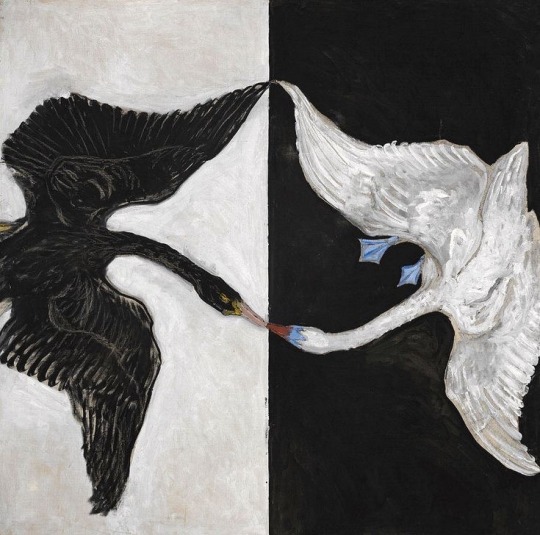
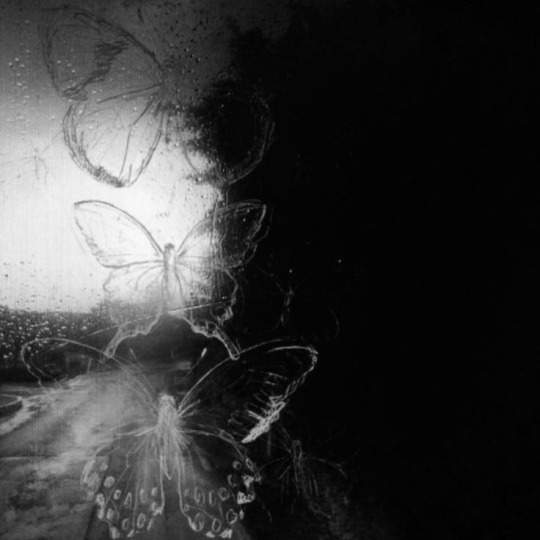

one two three

explanation.
I always see people say that there are many forms of love, not just romantic. Which, they are correct in. Yet, they still have a narrow view on it and refer to friendship as an example, or if they are big hearted their pet… Which is completely fine, I just felt a desire to create a pick a card that’s focused on love but none of those things. I never saw a pick a card with this topic before, neither on youtube or on tumblr. Could just be me though. Felt like making it anyway. If you don’t want children, that’s cool, I chose this topic because I would like to be a mother one day. This reading also applies to the first child you will have, or you know, the next one.
disclaimer.
Remember to take things with a grain of salt, and only take what resonates. Not because I don’t trust my skills, but because several people read pacs, what’s not meant for you could mean the world for someone else. Besides, this is for entertainment and the energy surrounding you or the overall situation could change any second. Life is unpredictable.
how to pick your pile.
There is always several ways to pick a pile, and sometimes maybe multiple call for us. You can pick the one that you can’t take your eyes off, even if there’s another picture you might find prettier. You can ask your guides to guide you in choosing a pile, or go with the old regular closing your eyes and picking whichever one your eyes land on. I usually do that too.
proof read?
Unfortunately no. Please know that I would never put anything in my PAC with harmful intentions towards you or anybody else.

one
You, my dear pile one will be so loved for so many reasons! It’s truly incredible. Even though you might not think that you will be an awesome parent - maybe now, maybe in the future -, trust me, your child will think otherwise! First of all, they will have this adoration towards you staying calm even in stressful situations and knowing how to handle things, how to take care of them and provide a solution and smooth things out. This is will make them feel safe next to you, and with time calm down as they see that you yourself are calm too. Of course, you wouldn’t always be calm, but you wouldn’t show even when you are scared so there is someone grounded in the situation that can take charge even if just on an emotional level. - I am saying this because your spouse will help you out when things are hard, not because you aren’t capable. -
Another thing here seems to be that you will respect their privacy and love life, as long as they are safe you will let them love safely and explore their interests as much as they need to in order to be happy. You let them be independent all while allowing them to rely on you and come to you when they need it. They know that this isn’t something everyone has, so they are all the more grateful to have someone like you as their parent. You are not invasive, you are not judgmental but so full of love, acceptance and understanding towards them. Maybe because you had a childhood where you weren’t happy, so you will do your best to give them everything good that you couldn’t get to have. Full of love, and they will remember it for the rest of their life.
📜 nine of swords, two of cups reversed, four of cups, page of swords reversed, queen of cups side ways, knight of swords side ways - facing the other way -, three of wands
confirmation.
high school musical , adele , nelly - dilemma , ‘i will love you till the day that I die , someone in this pile had to give up on their dream to be a singer/musical artist, hamilton, ‘vanessa open the door please’, ‘ (…)running out of time’ , 777 , city girl , virgo - do you have tummy issues? - , rihanna & eminem / asap rocky , pink nails but w a lot of charms , diverse pile

two
Alright, so I will be honest with you. Your next child will have some developmental issues, but not necessarily life threatening ones. - neither in a sense of d*ath or having trouble living on their own. they will just need a bit of help. - While asking your questions I stuttered a lot despite being calm, so I honestly think your child will have speech issues. Maybe potentially this could be genetic, or anything of the sort.. They will love you because even if you will have a hard time, where your mental health or emotional state will be tested you will never ever in your life will give them a hard time for whatever it is that they are struggling with. You will be loving, kind, gentle and patient with them. Instead of forcing them to learn in a pace which will stress them out you will be the one to learn how to understand what works best for them, and do that. They will really appreciate this. Honestly, regardless of whatever this issue is, I feel sorry because they have such a sensitive heart. Even if they shouldn’t, there is just some things they take to the heart and might feel like they are the problem even though they didn’t do anything. Such a pure child, the sort that’s very well behaved, kind to adults and friendly to their peers.. so these thoughts really could just come from overhearing and misinterpreting conversations or perhaps just overthinking. The funny thing is, I do think you would be their safe haven because they know you would never judge them no matter what heartbreak they are going through. It’s like they can’t imagine a life without you.
Now, I don’t mean to be an asshole or scare anyone unnecessarily. I am not a doctor and I will never be, but the ace of cups reversed here can represent miscarriages or pregnancy complications. So please if you are a woman look after your health. I don’t mean to scare you bc at the end of the day this is a collective general reading and we don’t know each other, but it’s always nice to look after your health regardless.
On a MUCH brighter note though, they will truly appreciate whenever you support their interests. They might be a book worm, so if this is something you two have in common they could happily share their interests with you! They will do it regardless, but your baby would get so excited if you show interest in them.
You will also stand next to them and support them no matter what they go through in life, let that be good or bad, which is something they will really appreciate.
📜 six of pentacles reversed, knight of pentacles, four of wands, ace of cups reversed, the heirophant, the high priestess, seven of pentacles
confirmation.
twilight , renesme , butterflies , cross necklace , bbc , orange hair and freckles - this is for someone who will have a little boy - , ocean green eyes , what was I made for - Billie Eilish , 5sos , ‘i bet on losing dogs’ , mother mary , flashing lights , genetic , obsession with beats / drums ? - not for the child, a reader in this pile -

three
Your child, will sometimes give you headaches.. but they will really love you. If you have ever seen modern family then they sort of remind me of Hailey in the earlier seasons. Bratty, picks fights, doesn’t always understand where her mom is coming from but sees all the hard work that she does and appreciates and loves her mother - both parents really - quite deeply. Not to say I am calling your child bratty, or a brat. That’s not where I am going with this, rather your guides pulled towards letting you know this first so you don’t misunderstand the rest of the reading.
They will, first of all, love that you will give them everything that you can. Y’all will be pretty well off. Not only will you guys be able to live comfortably but they will have a few unnecessary things that they don’t even need or probably forget about in a few years after getting it. They are not ungrateful, rather the opposite. They know this is a privilege, they don’t look down on those less fortunate than you guys, they are just grateful that they have a parent that cares about them so much they would give them everything they ask for, even if things aren’t always the brightest. You also, always, without any question get them out of any trouble or uncomfortable situation and defend them. Won’t matter if they are in the wrong or not, that’s your baby and you will stand by them!
They also love to travel with you! They enjoy your company a lot and to make memories, they always look forward to exploring the world with you. They might also follow you around like a little duckling, even if you only go to the store or to do some super boring errands. Honestly, your kid is an extrovert and super clingy. In a cute way though for sure.
Your dynamic with them reminds me of a tiktok I saw months back, where the teenage kid was piggy back riding the mom and she was annoyed as she recorded saying “look what I have to deal with”, but in reality she truly just appreciated the love. Such an easy going and regular pile, love that for y’all.
📜 nine of pentacles, seven of pentacles, the hermit reversed, knight of swords, four of wands, six of swords, three of wands
confirmation.
thrift shop - macklemore , old house in the balkans/europe in summer - ?? so specific, did you travel back to your home country in summer or planned to? - , moonlight , witch craft , snake , ‘i know a place we can escape ‘ , those fluffy slippers that are like plushies & soft pjs , airplanes , power wires , lime - & cheetos ?? -

#pick a card#pick a pile#tarot#tarotblr#astro community#astroblr#free tarot#pick a deck#pick a picture#pick an image#tarot divination#tarot reading#tarotcommunity#tarot community#tarot cards#didn’t proof read sorry y’all
496 notes
·
View notes
Text
How to achieve our manifestation in less than three days.
This is a question that is always on everyone's mind because, let's be real, we are all impatient to get our desires as fast as possible. So what can we do to get what we want as fast as possible? Here is THE guide on how to do it.

Is begin "Delulu" the only method to make your manifestation come faster?
People often say that starting with a delusional mindset speeds up manifestation, and you know what? They're absolutely right! Being "delulu" is like wielding a powerful instrument that we can play however and whenever we like.
But why is it so powerful? Because we reprogram ourselves by slowly changing our mindset by faking that everything is already ours, reprogramming ourselves means unlearning things that don’t serve our wellness and replacing them with things that do.
Personally, I find it super effective to envision myself in an interview when I try to manifest, telling the journalist how I became so powerful and how everything I've manifested took little to no time. It works amazingly! I get what I want from the universe in just three days by doing this.

We can speed up our manifestations, not just by affirming and believing that we already have what we desire (which alone is often enough to make things happen faster), but also by applying some of the 12 laws of the universe:
The law of Devine ones:
This principle emphasizes that everything in the universe is intrinsically linked, forming a single, unified whole. It implies that we are all interconnected, not only with each other but also with the source, or universal consciousness. With this law, we simply apply the reality that we are already connected to our desire, even if it has to be created from 0. It is already connected to us, and vice versa.
The law of Detachment 1.0:
The Law of Detachment is a core principle in deductive reasoning and formal logic. It asserts that if a conditional statement (an "if-then" statement) is true and the hypothesis (the "if" part) holds true, then the conclusion (the "then" part) must logically be true as well. I will give a quick example: if I am a witch, then I can do magic (an "if-then" statement), so if I am a witch, and it is true, then the fact that I can do magic is also true. Applying this to manifestations is now as simple as it can be. If I am manifesting this (which is true), then my manifestation is already here (also true).
The law of Detachment 2.0:
The Law of Detachment underscores the importance of trust and surrender. By relinquishing control and not clinging to specific outcomes, you create a state of allowing that can make it easier for your desires to manifest. This approach minimizes stress and resistance, which can otherwise hinder the manifestation process. In essence, the Law of Detachment in manifestation is about balancing desire with surrender. You hold your vision and take steps towards it, but remain flexible and open to how and when it manifests in your life.
The Law of Inspired Action:
Manifestation may require us to take inspired, and intentional action aligned with our desires. This law emphasizes the importance of actively pursuing our goals and dreams while remaining open to guidance and opportunities. For example, if I manifest to go on a great adventure and make a lot of friends along the way, I will have to take the intentional action to book it.
The Law of Rhythm:
Everything in the universe operates in cycles and rhythms. This law suggests that there are natural ebbs and flows, ups and downs, and that understanding these rhythms can help us navigate life more harmoniously. A way that I manifest things is to listen to music that makes me feel powerful and in control of the whole universe. Everyone has this kind of song in their heart because everyone vibrates at a certain frequency and volume. One of mine for example is vampire heart (slowed) - Isak Roen
These laws are not the only way but they for sure are a way. You can use all of them or use only one it is really up to you and i really suggest you learn about the 12 laws because they are a must for manifesting your dream life.

if you are intrested in more intresting way to manifest don't forget to check my masterlist! I hope you have a blessed day or night!
-xoxo the journallo
#manifestation#manifesting#shifting methods#loa methods#manifestation method#manifesation#spiritual development#journal#explain the method#explained#manifestation tips#law of manifestation#law of assumption#how to manifest#law of attraction#neville goddard#loa affirmations#loa tumblr#loassumption#loablr#loa blog#loassblog#loa#manifestation blog#manifestation success story#manifestation techniques#manifestations#manifestingreality
453 notes
·
View notes
Text
Makeup Time
Idol Bang Chan x makeup artist reader
Word count: 2.6k
Warnings: Strong language/swearing, mentions fake blood, suggestive
Chan walked into the little make up area they had set up for you in the building they were shooting his solo music video. It was just a corner of the dungeon-like set with a few dividers between you and the rest of the crew that were working on setting up props and cameras but it still kept the two of you tucked away from the bustle of the set.
Most of the time you were being rushed to get eight faces of makeup done before call times, so the fact that you only had one face to worry about today meant you were actually able to relax and take your time. Also you wouldn’t complain about getting to stare at Chan’s pretty face longer than you normally would get to.
You’d had always had a crush on Chan. From the start he always made you feel at ease and joked with you. He was always sweet, going out of his way to do little things for you like bring you a snack from the catering table when it was his turn in your chair, knowing you hadn’t stopped in between any of the other boys to eat. He was beautiful inside and out, how could you not be smitten by him?
You always just dismissed the way he made you feel though because, I mean really, who didn’t have a crush on THE Bang Chan, right? You were just one of many, millions even. Why would he choose some average, every day, nobody makeup artist when he had numerous gorgeous women ready to throw themselves at him. Add to that you would immediately lose your job since you worked for the company. Chan dating an idol? Dicey but doable. Chan dating the staff? There was no way that would ever fly with JYP.
So, you ignored those thoughts and buried yourself in your career. You showed up and did your hectic job to the best of your ability every day. Still, even the days you were in a mad rush to get everyone done you always managed to have nice conversations with Chan in the makeup chair. For some reason this time felt more intimate, not being rushed, just being the two of you there in that closed off area.
Chan had noticed you from the day you started doing their makeup. You were the first person on set at a ridiculously early call time. You had been entirely set up and ready to get one of the kids in the chair as soon as they got there instead of them waiting around like they normally had to. You were dedicated to the company and your work and you were always so kind and patient with the kids, which wasn’t always easy which Chan knew better than anyone.
Over time he noticed the two of you seemed to have quite a bit in common and when he saw how much you over worked yourself, like he had a tendency to do, he started to do little things like bring you a coffee and a bagel, a bottle of water and sandwich, just something to keep you going. Talking to you was always easy but rushed and he liked that this time he was able to fully focus his attention on you for once instead of a hundred different things he had to take care of for the kids.
You had been working on Chan for about thirty minutes and had the base of his makeup completed. It was time to add the blood spatter effects for the particular scene they were getting ready to shoot. You dipped your finger into a dark sticky substance and went to dab it on his pouty bottom lip. Chan pulled back reluctant.
“Wait a minute what are you putting on my lips?” He asked nervously laughing.
“Can it get in my mouth?” You smiled rolling your eyes and nodded.
“Of course it can Chan, it's edible makeup effects.” Chan cocked one of his perfect eyebrows and tilted his head like a confused puppy.
“Edible?” He was so cute sometimes. You suddenly had butterflies in your stomach but you just laughed it off and leaned in a bit to dab it on.
“It’s chocolate.” The look of surprise on his face was comical.
“Nuh uh!” His tongue darted out as he licked what you had just applied to his lips and sure enough it was just chocolate.
“Chan! You can’t lick it off! Its “blood” remember?” He giggled and you dipped your finger into the chocolate again. You leaned in closer focusing on his plump lips to dab the chocolate on again. You turned to grab the something and as soon as your back was turned Chan licked the chocolate off. When you spun back around to find his lips clean again you rolled your eyes.
“CHAN! You have to leave it!” He gave you his thousand-watt smile that made his eyes disappear, flashing those dimples at you. You shook your head, dipped your finger in the chocolate and huffed this time as you leaned forward again staring at his oh so tempting lips to dab the chocolate back on.
Was god trying to test your patience or something? Suddenly you were Sisyphus and dabbing chocolate on Chan’s pouty kissable lips the boulder you would push up hill for eternity. You sat up once the chocolate was in place to inspect your work for the third time.
“Okay! Now DON’T lick it o-” Before you could even finish your sentence Chan’s tongue peeked out just enough to lick the chocolate off again.
“CHAAAAAN!!!” You whined loudly.
“Okay okay okay! I won’t lick it off again I promise.” He laughed. Chan was enjoying messing with you. He always thought you were so cute when you got flustered around him. To say that he was sweet on you would probably be a bit of an understatement. You arched your eyebrow at him defiantly.
“Really, I swear! I won’t lick it off again, scouts honor!” You sighed and got more chocolate. You leaned in and focused, well tried to. Your eyes shifted from Chan’s lips to his eyes and you couldn’t help but notice the way he was looking at you, big boba eyes sparkling with his boyish charm. It gave you goosebumps and made your heart flutter. You felt hot all of a sudden.
“I can’t concentrate when you look at me like that.” You said sternly and one corner of Chan’s mouth turned up in a smirk.
“Like what?” He asked playfully. You sat up and the look you gave him was serious.
“Chan you have to sit still and... just... don’t look at me like that.” Your tone was serious too but Chan was too busy trying to make you smile and failed pick up on it. He was always a little flirty with you, you knew that was just his personality but when it was only the two of you it was harder to just brush off and continue to do the task at hand and it made ignoring what you were beginning to realize was way more than a stupid little crush nearly impossible.
“I’m sorry,” He gave you a sly smile.
“I can’t help it. You’re just so pretty when you focus like that.” You rolled your eyes and leaned back in to apply the chocolate to his lips for the last time.
“Please don’t say stupid things that you don’t mean to me.” You abruptly pressed your finger against his lip and pulled away. Chan gently grabbed your wrist stopping you, his brow furrowed in confusion. He realized now you were upset, he just wasn’t sure why.
“Wait, what’s wrong?” You looked at his hand wrapped around your wrist. You touched him all the time, you had to in order to do his makeup, but Chan rarely, if ever, touched you and certainly never grabbed you. You snapped out of it and pulled away.
“Nothing, just forget it.” Chan stopped you again this time his hand grasping yours.
“Don’t do that, why are you upset? Why was what I said stupid?” You tried to pull your hand away again but Chan held on.
“Chan let go, I don’t have time for this. I need to finish your makeup.” Chan shook his head. He didn’t care.
“No. We’re making time. Tell me why what I said was stupid?” You couldn’t bring yourself to look him in the eye. You stared at your shoes.
“Look I know it’s just in your nature to be this charismatic flirty guy wrapped in boyish charm so you just say things you don’t mean without thinking sometimes but...” Chan cut you off.
“What do you mean ‘things I don’t mean’?” You sighed heavily wanting this mortifying interaction to be over. The happiness you felt about getting to spend a little more one on one time with Chan had morphed into utter embarrassment.
“Chan, you see actual pretty women every day, okay? I live with my hair up in a mess wearing makeup covered jeans and t-shirts, I’m not delusional. Like I said, I know you’re just a flirt and you’re not trying to purposefully mess with my head...” Chan was so confused.
“I’m not trying to mess with your head!” You nodded agreeing as you pulled your hand away.
“Yea I know you aren’t trying to so just... save it for someone you’re actually interested in, alright? Someone with an actual chance.” You turned towards your makeup station and mindlessly started organizing your things. You felt Chan take a step towards you and wished he wouldn’t. The small space the two of you were in felt even smaller and you were struggling to keep it together.
“I don’t get why you think you wouldn’t be someone I could actually be interested in?” You turned back around frustrated and finally looked him in the eyes.
“Don’t be willfully obtuse Chan! You’re PERFECT! In every way and you have a sea of beautiful women to choose from, you could never want some plain old, bottom of the barrel, JYP employee?!” Chan looked shocked and hurt.
“Is that how you think I see you? Because if so, I’ve done a real shit job expressing my respect and how much I admire you.” You stood there and shrugged your shoulders.
“That’s what I am Chan...” You looked away again and he angrily shook his head.
“No you aren’t! You’re so much more than just a JYP employee, let alone bottom of the barrel! Y/n you are an amazingly talented makeup artist, you are driven and dedicated to your career, the company and our team. You always put others before yourself even to your own detriment, you’re funny, smart, kind and you are the most beautiful woman I’ve ever laid eyes on. Y/n you mean so much more than you realize.” Chan closed the little space left between you, he brought his hand up, cupping your cheek, making you turn your head to look at him. When Chan saw your glassy, tear rimmed eyes, he leaned in and pressed his impossibly soft lips against yours.
His other hand found your waist and pulled you closer pressing his body against yours. You should have pulled away, you should have been freaking out, you should have been worried about your job, but you weren’t. Not for now at least, for now you were just a woman being kissed by the man of your dreams. Luckily out of pure instinct you managed to tilt your head and kiss Chan back. You wrapped your arms around his broad shoulders, threading your fingers through the back of his hair.
When he smoothly slid his tongue into your mouth you could taste the chocolate that you had just applied to his lips again. The kissing quickly started to become more frenzied and both of Chan’s hands found their way to your ass, gripping as he backed up you against your makeup station.
He started kissing down your jaw and neck as you held back small moans of his name and breathless gasps. Chan tugged at the collar of your shirt trying to get access to more of you kissing and nipping at your shoulder and collar bone. He claimed your lips again, backing you into the station harder this time, and knocking some of your things to the floor causing a loud crash.
You both stopped kissing and froze waiting to see if anyone would come see what the ruckus was. When nobody investigated Chan started kissing you again and you laughed trying to stop him between kisses.
“Chan... Ch-Chan... oh my god! You need to stop!” He snickered against your lips and started kissing down your neck again as you pushed against his firm chest.
“Seriously Chan!” You giggled.
“You have to be on set in less than fifteen minutes and I have to fix your makeup... again!” You could feel his warm breath against your skin when he laughed but he continued his assault on your neck and shoulder as his hands roamed your body.
“Bang Chan five minutes to set! Bang Chan five minutes to set!” You both jumped when you heard the set coordinator yelling out Chan’s call time. He unglued himself from you and backed off enough so you weren’t pinned against your station anymore.
You both adjusted your clothes and hair and when Chan looked up at you he started giggling. There was a smudge of chocolate on the corner of your mouth. He reached up with his thumb and swiped it away before sticking it in his mouth and sucking the chocolate off. You turned quickly looking into the mirror to make sure there wasn’t any more on your face, wiping at it with a makeup remover just in case.
“Sit down quick! I have to fix the blood on your face.” Chan smiled brightly as he sat down and you quickly put the chocolate blood spatters on his lips back in place. You shooed him from the makeup area as soon as you were done, pushing at his wide back to get him to go but he planted his feet and refused to be moved, then he turned facing you again.
“Go out to dinner with me tonight.” You didn’t know why but you were shocked he’d just asked you that. You just stood there for a minute.
“What?” Chan grabbed your hands and held them as he looked into your eyes.
“Go to dinner with me tonight, a date. Please.” All the logistical issues you had tried ignoring earlier started flying through your head now and you let out a heavy sigh.
“Chan... we can’t. I love and need my job. They would fire me in a heartbeat if they found out we were even kissing just now, let alone going on a date.” Chan wrapped his arms around your waist pulling you close to him again.
“You really think that I would ever let them get away with doing that?” You pressed your lips together tightly. Chan did have pull in the company. If anyone could protect your job it would be him. You thought about it for a second and then nodded.
“Okay, dinner tonight.” Chan smiled and leaned in to kiss you but you pressed your finger against his forehead stopping him.
“Nuh uh. I’m not fixing this again. Now get your cute butt to set before we get busted.” You spun him around by his shoulders and started pushing at him again. He took heavy, lumbering steps dragging it out and just as you were about to push him out of the makeup area all together, he looked back at you and smirked.
“So, you think I have a cute butt?” You rolled your eyes laughing, gave him one big shove out the entry and waved him off.
“Goodbye Bang Chan! Always a pleasure working with you!” You called after him and he laughed as he walked off to go to set.
@hityoulikebahng 😶🌫️
305 notes
·
View notes
Text
Bad decisions // Quinn Hughes

No god, no religion … just bad, bad decisions
Summary: Quinn gets dragged to his girlfriends favourite bands concert despite it not being his favourite genre, but all it took was one song to change his mind.
Warnings: drinking, swearing, light fluff, pda (18+)
── ∘◦ ⛤ ◦∘ ──
“I can’t believe you’re dragging me to this.”
“Hey, you knew what you were getting yourself into dating me.” I commented as I applied my lipstick, looking back at Quinn in my mirror.
I wasn’t wrong, but I also never expected him to pursue someone like me either. I wouldn’t really consider myself an “alternative” or “goth” girl though. I had black hair, tattoos and listened to heavier music but I preferred wearing aritzia sweat suits, doing Pilates and swapped wing liner out for clean girl make up. Still, I wasn’t the stereotypical girl that most hockey players go for. I remember the first time I met Quinn and how terrified I was to take my sweater off and expose my full sleeve. But much to my surprise, he couldn’t keep his hands off me. Actually, any time I went to get a new tattoo he came with me and held my hand the entire time. It was a kind of intimacy I never thought I would find.
“I know, I’ve just never been to a concert like this. What if I get stuck in the middle of a mosh pit? Also how loud is it gonna be?”
I chuckled, zipping my boots up, “we’ll stay along the side, and yes, bring earplugs.”
“Oh god.” He groaned, throwing his head back on the couch. “You are so lucky I love you.”
“Well…” I trailed off, standing between his legs, leaning over and gripping onto his thighs. “If you’re on your best behaviour, I’ll reward you for it.”
Quinns head popped up as I peaked his interest. “What kind of reward?”
“Whatever you want.” I replied, hovering over his face. His lips ever so slightly brushing against mine, “but you need to be a good boy.”
“I’m about to become the biggest Bad Omens fan you’ve ever seen.”
About an hour later we arrived at the venue, my stomach was filled with butterflies from excitement. I’ve been a huge Bad Omens fan since 2016 and this was my first time seeing them post-covid. Their new album had been out for over a year and I played it so much I think Quinn was getting sick of it, but I would catch him mouthing the lyrics when he thought I wasn’t looking. This man tried to convince me he only listened to rap and country, but I firmly believe he didn’t want to admit he likes my music. I think he was paranoid his brothers or his teammates would tease him for it.
“I think you’d look really hot in that shirt.”
Quinn and I waited in line at the merch booth before the concert, which was incredibly long. I saw a hoodie on display that I really liked so I wanted to see if they had it in my size. Another shirt caught my attention and I fully envisioned Quinn wearing it with his black Levis, a backwards hat and his white nikes. Just the thought of it made my knees buckle.
“You think so?” Quinn leaned his head down to take a better look at the shirt in question. His cheek brushed against me, making his cologne hit my nose. It was the perfect mix of sage and cedar. I gently kissed his cheek, a bashful smile appeared on his face before he pressed his lips to my temple.
“Absolutely. I mean, you make everything look good.” I breathed, still reeling from his lips, “but I’d love to see you in that.”
“If you say so.” He smirked as it was our turn. He bought my hoodie for me along with a signed vinyl, and the shirt I told him to get. He sent me the most devilish grin as he tapped his credit card, knowing he just made me incredibly happy.
We made our way towards the stage, it was already pretty packed so I suggested we stood at the back near the sound booth. That way we would be out of the way of any crowd surfers or mosh pits because no one was dumb enough to fuck around expensive sound equipment. The concert was everything I hoped it would’ve been and more. The openers, I see stars and Erra put on incredible sets. Quinn looked like he seen a ghost when Erra came out, considering they were a little heavier than I see stars were, which made him look so adorable. Towards the end of their set, he was more impressed than scared which was a relief. Small smirks kept showing up on his face that he desperately tried to bite back but he couldn’t.
“You surviving?”
“Yeah, thank you for bringing me.” Quinn replied taking a sip of his drink, “I’m actually having a lot of fun.”
“Good, I’m glad.” I mused, “we haven’t even got to the best part yet.”
Before he could say anything, the lights went dark again and Bad Omens slowly made their way to the stage. My heart was rapidly racing in my chest as the boys opened up with Artificial Suicide. I immediately started jumping up and down, screaming the lyrics, completely forgetting about the world around me. Every now and then I would look up at Quinn, who just had the biggest smile on his face watching me enjoy myself.
Halfway through the concert, the band slowed the pace down, which came at the perfect time. My drinks were starting to hit me, making my head feel lighter than normal. The melody for Bad Decisions started and I immediately fell back into Quinn, becoming enamoured with how his breath crept along my neck.
Her skin feels unholy, but I'm still drawn
The morals I'm holding, you know they're gone…
His arms wrapped around my stomach as he slowly swayed us back and forth to the beat, slow and reverberating. His skin felt warm to the touch as his chin rested gently on my shoulder. The low vibrations from the song along with the siren red lighting was stirring something up in me. My hips instinctively rolled into him, feeling overstimulated by every single sensation that took over my body. I knew Quinn wasn’t complaining, considering I felt him twitch through his jeans.
You can be all I got, what's the difference?
Hennessy and a lot of bad decisions
All I know is bad, bad decisions
Quinn brushed my hair away from my shoulder, slowly planting kisses on my exposed shoulder. Each kiss nonchalantly making their way up to my neck, then my jaw, causing goosebumps as his week old stubble grazed my skin. My eyes stayed shut, as his lips dragged all over me. An audible gasp left my mouth as he lightly nipped at my skin, gently sucking, leaving his mark on me.
“Turn around.”
I turned around, his arms found me again and bringing me closer to him. My hands found their home in his hair, enveloping his curls between my fingers. The soft aura of the red lights made his green eyes the perfect muse in this dark room. I was so lost in him that I forget where we were, the crowd completely melted away from us and it was almost as if we were the only ones here. He had that effect on me, he knew how to make me feel like I was his, and only his. His forehead pressed lightly against mine, lips hovering so close I could taste the whiskey on his breath. The gap was finally closed, his mouth enveloping mine as I turned into putty in his hands. Our tongues danced together as the song was getting close to the end, but Quinn didn’t seem to care. He pressed me harder against his body, wrapping his hand around the back of my neck and kissing me with such desperation. He never gave me any chances to come up for air, his lips stayed glued to mine as if my mouth gave him a new breath of life.
Bitter ends to the night, I'm along for the ride
Out of breath, out of time, everything has a price
We broke apart and the smallest smile curved at the side of his mouth as he trailed his thumb along my mouth. Neither of us realized the band started to play What do you want from me? shifting the energy in the venue. The music slowly filled my ears like I was underwater and coming up for air finally. I smiled back at him, I was in a complete state of euphoria.
“Okay you win.” Quinn said into my ear as I gripped onto his shirt to keep my composure. “I definitely just found my new favourite song.”
“You have no idea how happy that makes me.” I mused as I had a lightbulb moment, “we need to get you into the pit.”
“Babe, no -“
I grabbed his hand and drug him into the crowd. Everyone was moving around and having the best time. I had to admit this was one of their better songs and it’s physically impossible to stay still during it. Quinn stood there frozen before giving in and started to jump around with me, not daring to let me out of his grasp. He sung the lyrics he was embarrassed to admit he knew with me, caught a guitar pick for me and held me as I cried during Just Pretend.
“Holy fucking shit, this guy is an animal.” Quinn gasped as the lead singer, Noah let out the most primal, gluttonous screams during the encore of dethrone. He wasn’t wrong though, I could feel those screams in my bones.
The concert finally ended, tears prickling my eyes as black and red confetti stuck to us and covered the entire floor. I didn’t want to leave but we had to. That was the best concert I’ve never witnessed and it felt so bittersweet that it was over.
“So, have I been a good boyfriend or what?”
I just chuckled as we made our way outside. The cold air hit my face and it felt like heaven after being a sweaty mess for three hours. We got into the car and Quinn leaned over to help me with my seat belt. I never once questioned why he started doing it, but I wasn’t about to complain about my boyfriend being this close to me at any given moment. His eyes were a perfect shade of green, the kind of green you wanted your morning matcha to be. They peered so deeply into mine I didn’t realize he asked me a question.
“So what’s my prize?”
“You’ll find out when we get home.”
153 notes
·
View notes
Text
Light's relationship with his father is such a heartbreaking multi-faceted tragedy to me I hate it so so so much.
Soichiro loves his son so much, and while he's certainly not a perfect father I know that he cares deeply about Light. He wants to prove Light's innocence so badly but he can't let go of the underlying doubt that he might really be Kira and it gnaws at him. He does not know that from the very beginning he was being used by Light, whether it was to obtain information about the investigation, or to get to L, or to strengthen the foundations of his own lie that he wasn't Kira, this entire time he was simply another resource. He'll hang onto this doubt for years, even after L is dead, even if he doesn't express it in the latter half of the series, until he himself is on his deathbed, with what he believes to be undeniable proof that Light isn't Kira. (It's a lie, of course.) He dies happy, but it's on the foundations of blissful ignorance. His own son brought him here, brought him to the point where he had to sacrifice half of his own remaining life span, to his own death march, and was still trying to use him even now to kill someone else, but he doesn't know that. Soichiro said that what was evil was the power to kill others, and that whoever used it was cursed. Light was that cursed man, of course, and he tried to bring that curse onto Soichiro too by making him kill in his last moments. Soichiro was happy regardless, because he didn't know. He'll never know. (In the manga/anime at least. More on that later).
Light loves his father but it's not enough to turn him away from the terrible decisions he's made, if anything it only fuels them. His idea of "justice" is a twisted model of what he parroted from Soichiro, and he uses his father as another pawn (and a powerful one at that) in his plans. If he can prove that Kira is justice then perhaps his father will no longer call Kira, and therefore Light, evil, so he just needs to ensure that Kira becomes justice, right? It's Light's own actions that land his own father in the hospital for a stress-induced heart attack and yet he says only a few minutes later that he's the happiest he's ever been in his entire life. Even after Soichiro denounces Kira by calling him evil, even after he calls the Death Note's power evil, even after he unknowingly tells Light that he is cursed. When Soichiro dies Light is too deep in his own plans to actually properly process the fact that his own father is dying past what it means for his goals, but at the same time he still cares enough that after the fact he'll genuinely cry, only to brush it all away later. (Personally, I don't have a single doubt in my mind that Light's crying in that scene was genuine and I Will die on this hill). Soichiro had unknowingly denounced Light one last time just before his death, openly relieved that he "wasn't Kira after all", which also reveals that he has had doubts about Light this entire time, even after L died. By the time he's caught at the Yellow Box Warehouse Light will have denounced his father too, seeing him as someone who was made to be a fool, someone who was naive, even, too earnest for his own good. He won't realize that part of this description of his father might have applied to Light himself, back when this all started. Light takes after his father so much in so many ways already, so why not in this way too?
Ough. And honestly the other adaptations never miss out on this tragedy either, and I love them for that. (spoilers for the musical and 2006 live action movies I guess?)
In the musical we see Soichiro express his doubts and conflicts about who to believe, Light or L, if the son he raised really is a murderer, if everything he knows about him is just a lie. Like, there's an entire song about this, and you can tell how torn he is about it all, how badly he wants Light to be innocent but about how he also needs to face the truth no matter what it is, but at the end of it all he doesn't even get the answers he wants. At the end of the musical the only thing he finds is two corpses, Light's and L's, with no answers. No last words, no closure, only dead ends and a dead son and a grieving daughter. It's so awful I hate it here.
And the live action movie is fucking Insane. Like, wow. Okay. (Spoiler for the ending of Death Note The Last Name I guess) In the 2006 movies/novels Light writes Soichiro's name in the Death Note himself, and it's such an inconcievable move that it leaves even Misa shocked; Light tries to make Soichiro give him the Death Note for the last part of his plans, seeing his death as a "necessary sacrifice" (insert tangent essay about why I think 2006 live action movie Light is actually the most "coldhearted" Light Yagami, despite how infamous anime Light is). It doesn't work, and Soichiro does end up finding out that Light is Kira this time, and they have a confrontation, but he doesn't even sound truly hateful towards Light for it. He Never seems to outright hate Light for it, even after Light calls the whole confrontation a waste of time and instead tries to continue killing with the piece of the notebook in his watch, even after he tries to get Ryuk to kill everyone. When Ryuk inevitably writes Light's name and he collapses, Soichiro still reaches out for him and holds onto him as he's dying. Light literally dies in Soichiro's arms, still looking for the validation that he was right, that this wasn't all for nothing, that he was doing the good thing, trying to make Soichiro understand that he was trying to enact justice based on what he learned from him in the first place. Soichiro not only learns but sees for himself what his son has become, and Light dies in his arms leaving no closure for either of them. Soichiro will announce Light's death in L Change the WorLd on the news without saying his name, saying instead that it is only Kira who is dead, even though he and Light are one in the same. Sachiko and Sayu will never get to know the full truth about what happened to Light, instead Soichiro will lie and instead tell them: "Light was killed by Kira."
And then holy Shit the jdrama. If I write about it here this post is gonna literally double in length and also I don't really wanna spoil it but. Man. Man. If you watched it you know. Holy Shit dude I Cried.
It's the fact that, canonically, Soichiro will die oblivious to what Light has done, but even in the instances where he does find out, it doesn't make it any better, and it doesn't make him love Light any less, it just gives him more to grieve.
It's the fact that there isn't a single universe where Light doesn't use his father for his own gain, whether to gain information, or to try and control him with the Death Note, or make him write in the Death Note himself, and not a single time will he realize just how far he's strayed from Soichiro's ideals, and not a single time will he not forsake him for it by the end of the story.
It's the fact that, despite everything, Light will always refers to Soichiro as "dad/my dad" (informal) rather than "father/my father", even after he has been "denounced" (and this is true in every language that Death Note has been translated in, as far as I could find. Man, isn't that so cool! :) <- Through tears).
Anyways that's what I've been thinking of how's your guys' days going
#death note#dn#death note jdrama#death note live action#death note musical#i guess i can tag those#light yagami#soichiro yagami#coda analyzes stuff#i wrote like 90% of this at like 5 am because i was trying to sleep but then a Light Yagami Thought occured#i can't stop i can't stop the stupid analyses#my drafts are slowly piling with them make it stop helpppp#i hate this fucking series !! augh#ohhh shit this post is like 1.4K words long i am actually like so sorry if you read this whole thing through damn#i don't know if this is coherent i had to proofread this over several times but i still don't know if it makes any sense#and i don't feel like proofreading it another time. welp. hits post
453 notes
·
View notes
Text
Plutonian Women
(and unraveling their destiny)

This post can be quite messy because I only wanted to share my thoughts on this topic. Do not take all of this as my absolute truth because these are things that I've thought for quite a while seeing it in my life and personally too.
Something I've realized lately is that Plutonian Women go through unique situations that set them apart from other people. And in this case, I'm refering to women only and not men because this is based on my experience, and you all know that energies manifest differently according to the gender so I'm not gonna afirm this also apply to men when I haven't seen it in my world, also, as we are tired of seeing, women are treated differently from men in our society so we cope with things differently.

Firstly, I wanted to talk about placements that make a woman Plutonian in my opinion (when I say "Plutonian", I mean someone who is heavily affected by Pluto in their natal chart), but you can relate to this post whether you have some of these aspects or not, so share your experiences with me, I'd love to know!
🔮 1H/5H/8H/10H Pluto.
🔮 0° Pluto.
🔮 Pluto in water degrees (bonus points if there are aspected placements who are also in water degrees).
🔮 Pluto aspecting big 6 (specially harsh aspects: conjunction, opposition, square, contra-parallel / also specially the luminaries - sun, moon - and mars).
🔮 Pluto in the same personal planets/asc.
🔮 Pluto aspects to outer planets in case it's also aspecting big 6.
🔮 I think Pluto aspect BM Lilith/Chiron can also play a part in this.
🔮 Scorpio Pluto if it's conjuncting or heavily aspecting other placements.

What distincts a Plutonian Woman from the rest is their gravitational energy that pulls you in like a black hole, and as intensely as one. Their eyes hold a shadow of their past traumas and occasions but with a touch of mystery that makes you wonder what they went through in their lives. Their stare is heavy and filled with emotions (let's not forget Pluto still rules a water sign).
I don't like to condemn people for their placements, but I think Plutonian Women came to this life to suffer a lot before gaining what they want and deserve, and this seemingly infinite cycle of pain will only end when they learn how to cope healthily with things of life. One of the reasons why they go through so much is their way of seeing and feeling. Plutonian Women feel things in almost a transcendental way, they feel intensely and with this, they can put themselves through "unnecessary" situations when not careful. They're also prone to self destructive behavior, their heart usually puts a dark veil in their thoughts when their emotions come crashing in like a hurricane. Their pain is the embodiment of "female rage", when they cry hard, it's a mix of anger, sadness, sorrow and everything that they were holding back from a while - because they do hold emotions - but they can't run away from their deepest parts, and one day everything overflows and they can finally reborn from that suffering; the music "Pretty When You Cry" describes them perfectly, because they're indeed pretty when they cry and crying frees them in a way, and a lot of people actually like to seem them suffer? Plutonian Women attract questionable men or women (romantically), because they're almost like a beautiful show to watch, and these men/women like them best when they're falling apart, but manipulation can arise and fool them (they should be careful with 12H synastry specifically, the apparently good ones can actually be the wolf in sheep's clothes).
But back to the way Plutonian Women perceive the world, they are actually fragile at heart, but they try to hide it at all costs, they have a pure heart who could be derranged due to childhood/romantic/any other issues but who has no bad intentions most of the times. I think of them as victims of situations they have no control of since young.
However, to be more positive, I'd like to say that this is not a death sentence at all. Indeed, death is the right word to describe Plutonian Women because they die all the time (figuratively speaking, but literal death can be very present in their life too) and they are reborn as better people. Unfortunately, justice or karma is not much on their side because the world can be a place very unfair most of the times, but I think this is due the fact that they souldn't focus on revenge or negative thoughts, even though they can do it a lot as a way of thinking as a "justice". But the message they should learn is that they should focus on getting better, prettier, wiser, smarter instead of losing energy thinking on lower vibrational people.
The truth is that Plutonian Women are the defintion of a a Phoenix, if you do them wrong, you can be sure that they will gain their dignity back and get back stronger than ever, even with a "fragile" heart as I said, they have a malicious mind that protects this side of them; and also, once they apparently heal their deepest and oldest wounds, it gets harder and harder to break their shell, but if you were capable of doing so, just know that you opened all of them and made the Plutonian suffer all again and go to hell and back.
Overall, the word that describes them best is "raw" because this is what they truly are (in the best way possible lol). Due to this, they can attract a lot of hate - similar to lilith women and specially if they are also lilith "dominant" - from people who don't understand their beauty or actions, because their beauty is truly sharp, hypnotizing, dark and undescribable, furthermore, their actions are particularly unique and most of the times hide their intentions, they never do something significant without thinking first. They ultimstely search for what's beyond the surface, when in love, they wanna know your soul and more, they despise flings, they wanna get to know the depths of their s/o's being, they love hard but also get heartbroken hard when it happens. Academically, they like to be strategic and hardworking when they see it's worth the work, they can be perfectionist because they're hard on themselves most of the times. So, afterall, what's their destiny? Their destiny is to feel accepted and comfortable in their own skin, to get over their traumas and allowing themselves to be better, to let go of toxic people and surroundings, to not engage in toxic relationships anymore, to free themselves from karmic debts and to be finally happy.
Plutonian Women probably feel a deep connection with spirituality, astrology, pstchology, crying, darkness, mystery, the unknown, black/red/purple/dark blue, sad and profound songs, the night, dark places in general, mourning, wakes, death celebrations, soul level bonds and conversations.
Plutonian Women are masterpieces who deserve more from the world and people, they've gone through a lot and they should be 100% respected, sending a lot of love to all of you ❤️🔥

Hey guyssss, I missed posting actual posts here but I wasn't feeling inspired lately. But I'm back!!! I hope you guys understand my point of view and I typed this with all my heart because I was based on my personal experiences and people around me's experiences. I was thinking in also making a post about Lilith Women since I also have a lot to say about that either ! Thanks for the support and see you later or sooner 💋 Also in case you noticed I didn't focused in scorpio placements here because I think they work differently (I just don't know how to explain this difference tbh, so I focused on actual Pluto)
1K notes
·
View notes
Text
This Week in BL - Mame is fielding one of my favorite shows, what is the world coming to?
Organized, in each category, with ones I'm enjoying most at the top.
(This was gonna be ready yesterday and then I realized I'd missed 2. Sigh. I'm doing well.)
Feb 2025 Week 2

Ongoing Series - Thai
ThamePo (Fri YT) ep 10 of 12 - SHUT UP. I love them more than anything. I love how nervous and hesitant Thame was the next morning. Def the younger boy who bagged the experienced older dude. This show makes me go “aww” a lot. I do hate this part of the plot though. Because I loathe parasocial fandoms with every fiber of my being and this is why.
The Boy Next World (Sun IQIYI) ep 6 of 10 - The plot has gone wildly off the rails, like into Days of Our Lives waffle iron territory. It is utterly absurd. But I'm still watching it.
The Heart Killers (Weds Gaga) ep 12 end - I love Style so much. The perfect Brat but he is playing Petruchio not the shrew! Ironic and very kinky twist on the original. I also love how most BLs are like “we’re gonna separate them for 2-5 years in the final ep” and Kant & Style were all “fuck that noise.”

Summary
Jojo directs this action romcom about assassin brothers (Khao & Joong) meets tattoo artist ex-booster (First) and very flirty mechanic (Dunk) conmen. I dithered over how to rate this. It felt like an 8 show wearing a 9’s britches. There were dropped threads, forgotten characters, and unfinished plot lines even with a particularly long run time. And, for me, it doesn’t have significant rewatch potential. But it was fun (when one applies no expectations or logic) and I enjoyed the wildly unhinged relationships and, weirdly, music. I mean nobody claimed that we needed Taming of the Shrew only with gay Thai hitman, but we really needed it. And no one asked for Petruchio as the gayest brat ever to strut his perfect skin and copped-top across our screen, and yet we loved him for it. Sure it didn’t make sense, was utterly absurd, but it was terribly earnest and sexy about it. IN the end this goes hand-in-hand with all these other absurd crime pieces we’ve been getting since KP, and frankly I like this one the best from Thailand so far. 9/10 but I’m slightly uncomfortable with that decision.
Perfect 10 Liners (Sun YT) ep 16 of 24 - It’s cute. They were cute. I enjoyed it. But I am still mostly just looking forward to the next couple.

Sangmin Dinneaw (Sun iQIYI) ep 7-8 end - I forgot to watch this one for over a week, goes to show how engaged I am. Anygay, ep 7 amnesia trope is ago. A lot the ep was fuss in hospitals so I went ahead and watched the finale as well. It was fine.
Conclusion
Given its charmingly simple premise and a solid lead pair, this could’ve been quite an tidy little BL, but it went all weird and slapstick and overtly sexual (and I enjoy high heat). It was a little bit like YYY meets modern Thai BL but mixed with early Japanese pinks. All very strange. I ended up being half bored half annoyed half confused half embarrassed. And if that’s too many halves for you, now you know how I felt. 5/10
Flirt Milk (Sat YT) ep 4 or 10 - Umm plot? Where are you?
Ossan‘s Love Thailand (Mon YouTube) ep 6 of 12 - Workplace harassment, form of... Thai BL.

Ongoing Series - Not Thai
When it Rains it Pours (Japan Thurs Gaga) ep 6 of 10 - Is the live-in boyfriend meant to be perceived as a psychopath or just a controlling monster? I love how blunt Sei was with him. Such and honest little bean. Ah, controlling monster. Well, I really hope they can resolve this in the final episode. Despite all of the pain I’m enjoying it, it's being true to itself.
This is JBL doing its thing and toeing the Tokyo in April party line. I don't know why anyone would expect anything different. Go watch Eternal Yesterday and drink me later. This is what Japan DOES with BL at least half the time. The more JBL we get, the more of this kind of show we get with it. It's a numbers game - just add bruises.
Heart Stain (Korea Weds IQIYI) eps 3-4 of 8 - I have to admit that the only reason I even tolerate love triangles as a trope is because of K-dramas. But I still don’t like it. That said, I do like all of the honesty and conflict that's built into this story and frankly dealt with because of the trope. And I love how massive Woohyeon is so baby girl. The lap sitting was extremely cute. The teacher finding them lap sitting was also cute. And the handhold drag afterwards was cutest. The whole scene was adorable.

FC Soldout (Korea Thurs iQIYI) eps 5-6 of 8 - Tiny idiots. Every. Single. One. (@heretherebedork you must be loving these boys.) Give me a sec to talk to a character: Captain. Sweetcheeks. You know there are better ways to exhaust your adorable boy-toy late at night than forcing him to do physical labor, right? Or, at least, not that kind of physical labor.
Eternal Butler (Taiwan Fri Gaga) eps 9 of 12 - Oooo. emotional Ever 4. Poor baby. I did want to see him kick ass. Hopefully that’s the beginning of next week’s episode.
Impression of Youth (Taiwan Weds Viki) eps 6 of 9 - Very little happened in this episode. Lots of flashbacks. And stuff we’ve already seen.
Fight for Love (Vietnam YT) ep 2 - Ooo 2 timing? Coils within coils, tongues within tongues, my goodness these boys are getting around. It’s all very messy gay drama llama ding dong but... comedy. It’s a new one on me. But sooner that than Thailand’s Only Friends version.
Exclusive Love (Taiwan Fri Gaga) eps 1-2 of 12 - Shy aspiring singer inherits funeral business. Nice to have something more from Taiwan to watch. But this is extremely odd, and somewhat extreme behavior, given the premise. That is a lot of personnel and sunglasses just for one guitar-playing influencer. Even if I agree that he shouldn’t be allowed to play. Surreal that it’s a mafia funeral business, although I suppose it makes sense. It’s not creepy, but the creep-factor is high with this show. It's also v thirsty already. I kind of like the sides, but they seem to be in a different BL. So far, mostly whiplash but I'm not mad about it.
Checkered Shirt (Korea YT) ep 2 of 8 - It remains awkward and cute, but a little boring for a short.
Teenager Judge (Vietnam Sat YT) ep 19 of 20 - Today in: how to tell your suicidal stepbro you wanna d**k him out.

It's airing but......
Gelboys (Thai Weds iQIYI) ep 1 of 7 - I’m immediately terrified by the fact that he’s carrying a guitar around. It’s slow with that dirty gritty high school authenticity thing from OG Love Sick. Which is not my favorite style of any show, let alone BL. I always get Kids PTSD. I think I’m gonna give this show a pass. It’s just too far out of my wheelhouse. I don’t have patience for this right now.
The Last Time (Thai WeTV) trailer - from 2024, not sure about this one, looks dark. Since it's also difficult for me to get hold of I am giving it a pass until I know about the ending.
Speaking of which...
In Case You Missed it
I Will Turn Back Time (China Gaga) 6 eps - Spies report it does not end well. Stepbrothers trope = yeah! but all other messaging = boo. I'm not gonna bother.
End of year wraps are here!
2024 Trend Report
MY BEST & WORST BLs of 2024
Best Kisses (and sex scenes) of 2024
BL's 2024 Quirky Awards
2024 Awards - Quick Picks
Next Week Looks Like This:

2/21 Bali Hai (Thailand ????) no MDL listing, only rumors, unsure on deets.
2/27 Secret Relationships (Korea iQIYI) - Stars Wei's Kim Jun Seo. Adapted by Cradle Studio (Kakao). About clever and resourceful Daon who has worked hard to overcome being poor. His cheap ways annoy his coworker, Sunghyeon but after “an incident” with his parents, Daon grows closer to him. But Daon also has feelings for his former tutor. This has the signs of a classic Kdrama all over it: Office setting, love triangle, lead suffering for his self-actualization. I’m optimistic about a longer treatment.
2025 Line Up
BL Announced for 2025 - PART 1
BL Announced for 2025 - PART 2
20 BLs Announced for 2025 That I'm Really Excited About
GMMTV 2025 Line Up - My Totally Biased and Wildly Flawed Feels
THIS WEEK’S BEST MOMENT
Got nothing. Frankly you're lucky this came in a somewhat timely manner, with any screen caps at all. It's chaos 'round these parts.
(last week)
The tag BLigade: @doorajar @solitaryandwandering @my-rose-tinted-glasses @babymbbatinygirl @babymbbatinygirl @isisanna-blog @mmastertheone @pickletrip @aliceisathome @urikawa-miyuki @tokillamonger @sunflower-positiiivity @rocketturtle4 @blglplus @anythinggoesintheshire @everlightly @renafire @mestizashinrin @bl-bam-beyond @small-dark-and-delicious @saezurumurmurs
#this week in BL#BL updates#ThamePo#Perfect 10 Liners#The Heart Killers review#Eternal Butler#Heart Stain#Fight for Love#FC Soldout#Sangmin Dinneaw review#Flirt Milk#The Boy Next World#Ossan‘s Love Thailand#When it Rains it Pours#Futtara Doshaburi#Impression of Youth#Exclusive Love#upcoming BL#new bl#BL news#BL reviews#BL gossip#2025 BL#thai bl#taiwanese bl#japanese bl#vietnamese BL#teenager judge
122 notes
·
View notes
Text
How you are applying logic to shifting and why you should stop it

Examples of Applying Logic to Shifting:
1. Doubting the Process:
Thinking, "This can't work because it's not scientifically proven."
2. Overthinking Methods:
Debating which method is "best" or trying to analyze why certain methods work/ don't work.
3. Expecting Immediate Results:
Thinking, "If I don’t shift in X amount of time, it’s not real."
Focus on enjoying the outcome rather than the process.
4. Analyzing Your Feelings Too Much:
Thinking, "Am I feeling detached enough? Did I do the visualization correctly?"
Trust your intuition. If you feel ready or connected, that’s enough. And even if you don't as long as you want it, it enough.
5. Questioning Your Signs:
Seeing signs or synchronicities and thinking, "Is this just coincidence?"
Trust that the universe communicates in unique ways. Accept signs without overanalyzing their meaning. Coincidences don't exist.
How to Stop Applying Logic:
Approach shifting with the openness.
Focus on Feelings, Not Thoughts:
Ground yourself in emotions or sensations instead of analyzing your thoughts. For example, focus on the excitement or calm you feel about your desired reality.
Use Affirmation
Repeat phrases like, "I trust the process," or "Shifting is natural for me." This helps quiet doubts.
Meditate or Use Flow States:
Meditation can help you let go of overthinking. Activities that put you in a flow state—like drawing, daydreaming, or listening to music—can also help.
By practicing these techniques, you'll probably gradually get yourself to let go of logic and embrace the intuitive side of shifting.
What made me post this lmao


#reality shifting#permashifting#shifters#scripting#shifting advice#shifting community#shifting motivation#shifting reality#shiftblr#shifting blog#shifting consciousness#shifting to hogwarts#shifting mutuals#shifting methods#shifting mindset#shifting antis dni#shifting attempt#shifting affirmations#shifting#affirmations#manifast#manifesation#logic#spirituality
214 notes
·
View notes
Text
HONEYS IT GIRL MAGAZINE august edition⋆.ೃ࿔*:・🎀

welcome back to honeys it girl magazine, this is the august catalog. get ready for the inside scoop on data that i've collected, things i've learned/started doing, and just general info like that organized in kind of a teen-magazine inspired fashion. a magazine for it girls ✨ and now please enjoy, the it girl magazine.



WHAT UR DREAMS REVEAL ABOUT YOU ;
have u ever woken up from a vivd dream and thought "what does that even mean?" yeah same. so i decided to dive into this for this catalog and here's what i found. dreams represent unconscious desires and wishes. we have dreams that mirror our emotional state.
three of the most common dreams that people have are falling, being chased, and dying. which are all inherently negative things. when u dream of falling, it shows a loss of control over an important situation. when u dream of being chased, thats ur brains way of telling u that ur stressed out. and when u dream of dying, it could represent a part of you that is dying or something you'd like to escape.
and dreams about death are the most scary to me cuz i have MASSIVE fear of death but there are more than just negative dreams. usually my dreams consist of things that radiate positivity, or my dreams can be flat out weird. either way, if i remember my dreams i like to write them down and yap about them with my friends.
HAIR HEAVEN ;
i thought that since its leo season and leo's have the BEST hair its only right that hair is the topic of this month's beauty section. so im going to focus on talking about styling, treatments and general care.
how you style ur hair is SO super important to ur whole vibe and aesthetic. hair styles look different on everyone for a multitude of reasons but one of the most obvious is that people have different face shapes and different styles are flattering on different faces.
remember, u dont have to get the same haircut as ur favorite celeb bcuz its so much more cute and original when u get ur own haircut…💬🎀



now unto hair treatments. hair treatments are so important to keep ur hair healthy and lustrous and just well taken care of. so im going to give some hair mask and treatment recipes to keep ur hair healthy and radiant…💬🎀

now finally lets talk about some general tips to keep ur hair gorgeous and lovely on a day to day basis.
♡ use scrunchies instead of elastics when u can to avoid putting strain on ur hair
♡ incorporate collagen into ur diet with supplements or vitamins because its rly rly good for hair skin and nails
♡ when using heat on ur hair, use a heat protectant and try not to apply heat to ur hair on a daily basis
AUGUST MUSIC ;
this month i've really been listening to CHECK by the girl group FLO and let me just say, that song is an absolute MASTERPIECE. the music video was amazing. i love love the cinematography and the concept cuz its super hyper girly just like me and the girls looked so amazing and beautiful.



one of my favorite albums that also dropped this month was latto's sugar honey iced tea album. latto is so so talented and gorgeous and she rly ate down with this album so i highly recommend it to anyone who's been thinking about giving it a listen. my favorite songs on the album are shrimp & grits, look what u did and S/O to me.
BACK TO SCHOOL SEASON ;
for a lot of us, its back to school season and its the time to kind of transition from summer -> into the school year SO here are 5 tips on how to seamlessly transition from ur hot girl summer into a successful school year…💬🎀
♡ get urself an established routine
get urself an established routine 2 weeks before u start cuz the earlier u start ur routine, the quicker it'll be for it to become a habit. adjust ur sleep schedule by sleeping a little earlier, and going to bed at a reasonable time.

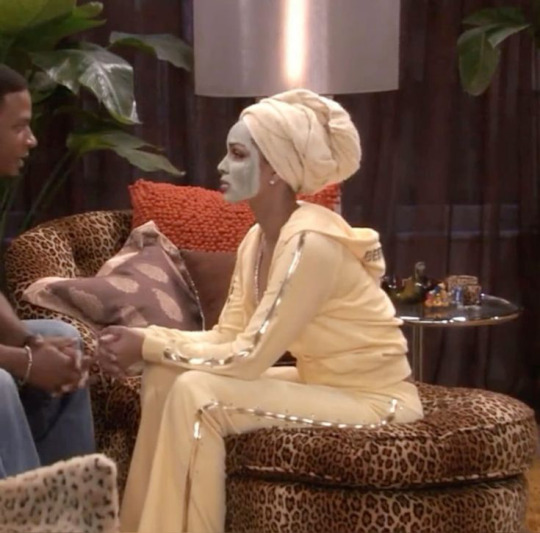

♡ reflect and write down some goals
reflect on ur last school year, what u did good and what u did not so good and based on that formulate a couple goals that u can commit to and hold urself accountable to so that then ur making progress thats trackable.
♡ be organized
organize ur notion, ur space, ur school bag EVERYTHING. organization is so crucial especially for school and can protect u from feeling overwhelmed and cluttered.
♡ brief review
im not the kind of person that like summer work, in fact i hate it. but a week or two before school starts i'll do a quick refresh or research the classes that im going to be taking to kind of set myself up for success.
♡ fix ur attitude
stay POSITIVE and dont take on a bad approach to this school year before you've even started. believe in urself, ur discipline and ur abilities and stay in a good mindset.
i have lots of back to school content planned still that hasn't dropped including studying, resources etc so that we can slay this school year…💬🎀
BACK TO SCHOOL FASHION ;


details for back to school fashion/academic princess style :
♡ plaid
♡ grey, pink, black and white color scheme
♡ collared shirts and jackets
♡ pleated mini skirts
♡ sweaters
♡ headbands
♡ knee/thigh high socks
long bouncy curls with a headband that matches something on ur outfit. ballet flats and leg warmers. baby pink gloss and square shaped french tips, delicate necklaces and bracelets…💬🎀
when i think of pink academia fashion the first person that comes to my brain is cher from clueless. here are some of her most princess academia moments in the movie.



cher emphasizes literally everything i've talked about in the pink princess school fashion scheme. the pretty socks, fluffy pens, collared shirts and pink->white->grey color scheme. even the way that she does her hair is very very pretty and flattering.
WHATS MY HOROSCOPE (AUGUST 25-31) ;
♡ you’re the star of the show this month, virgo! it all begins on august 4th with a leo new moon that awakens your zone of spirituality. you could be focused on sacred release to clear space, welcoming in new beginnings. confidence is cultivated through deep soul-searching. on the same day, venus enters your sign, bringing a boost to your energy, creative projects, and style. mercury stations retrograde, also in virgo, encouraging self-reflection.
♡ for aries, it’s an exciting month ahead! the action begins on august 4th, when the leo new moon activates your zone of pleasure, inviting you to follow your passions! a playful approach in romance and creativity can inspire new beginnings that feel fun and stress-free. on the same day, venus enters virgo and visits your sector that rules self-care, encouraging you to embrace healthier habits. In the evening, mercury goes retrograde in virgo, signaling a time for you to get centered.
♡ for taurus, it’s an emotionally powerful month. it all begins on august 4th, when the leo new moon activates your zone of intuition, bringing major insights that lead you to new beginnings. with your environment in the spotlight as well, you might use this time to beautify your living space, pulling in bold animal prints and patterns. later in the day, love planet venus enters virgo, activating your zone of pleasure. take a practical approach to love, money, and creativity. then, mercury stations retrograde in virgo, urging you to release perfectionism and rest.
♡ for gemini, his month is full of connection! the magic starts on august 4th, when the leo new moon activates your communication sector, inspiring you to shine your light, share your ideas, and express yourself. leo’s passion blends with the fresh slate of the new moon to bring you an exciting new path to explore. later, venus enters virgo, awakening your intuition so you can manifest! mercury stations retrograde in virgo as the evening comes to a close, marking a period of rest and awareness.
♡ for cancer, success is yours this month! it all begins on august 4th, when the new moon in leo visits your money zone, inspiring you to share your talents and build up your resources. the bold expression of your skills impresses others and serves as a beautiful boost of confidence for you too! you’ll crave more meaningful conversations when venus enters virgo, awakening your communication sector. mercury stations retrograde in virgo at the end of the day, signaling a time of required pause.



♡ for leo, it’s an expansive month! the excitement starts on august 4th, when a new moon in your sign ignites a path to new beginnings. you’re stepping into the most confident version of yourself! set intentions for the future with courage and inspiration. on the same day, venus enters practical virgo and visits your financial sector, helping you organize money matters and work projects. mercury goes retrograde in virgo that night, encouraging you to embrace stress reduction and physical relaxation.
♡ for libra, it’s an enlightening month ahead, libra! the leo new moon on august 4th activates your friendship sector and invites you to step into the social spotlight. you could be making plans with friends or passionately helping others. set intentions for the future and remember that dreams do come true! venus enters virgo later to help you get grounded as you explore your emotional realm. mercury stations retrograde in virgo that night, highlighting the importance of practicality.
♡ for scorpio, prepare for a month of empowerment! the leo new moon on august 4th inspires you to showcase your talents. by doing so, important people take notice and doors of opportunity open. don’t be afraid to courageously share your expertise. venus enters virgo later in the day, enhancing your powers of negotiation as well as your charm. mercury stations retrograde in virgo before the day ends, signaling a need for patience.
♡ for sagittarius, it’s an adventurous month! the fun begins on august 4th, when the leo new moon lights up your travel zone, encouraging you to explore on physical, intellectual, and spiritual levels. embrace new beginnings that bring abundance into your life. venus enters virgo on the same day, inviting in well-deserved acknowledgment and opportunity. mercury stations retrograde in virgo, asking you to review your long-term commitments and responsibilities.
♡ for capricorn, it’s a month of personal growth, capricorn! the leo new moon on august 4th awakens your zone of transformation and brings change. you could be healing your relationship with money or crafting a plan to tackle debt. when you surrender into evolution, manifestations become reality. venus enters virgo later and lands in your adventure zone. seek out experiences that feel fun, expansive, and abundant. mercury goes retrograde in virgo before the night ends and asks you to slow down.


♡ for aquarius, your relationships are highlighted this month, aquarius! the leo new moon on august 4th activates your relationship zone and opens new paths in love. create heart-led manifestations and enjoy quality time connecting with others. venus enters virgo on the same day and visits your sector of intimacy, encouraging you to bond beyond the physical plane. communicate with care when mercury goes retrograde in virgo that night, marking a time of potential misunderstandings and snafus.
♡ for pisces, get ready to fall in love this month, pisces! it begins with the leo new moon on august 4th that encourages you to love the most important person of all: you! this is the time to take excellent care of your mind, body, and soul so you can feel rejuvenated. venus enters virgo the same day, activating your relationship zone. strengthen your bonds! mercury goes retrograde in virgo that night, marking a time of healing.
CELEBRITY GOSSIP - BLAKE LIVELY ;
this month the movie "it ends with us" was released starring blake lively and justin baldoni and it has been gaining LOTS of traction on the internet for a multitude of reasons. i haven't been to watch the movie yet but if u have, tell me how it was!
the reason why im going to be talking about this in the celebrity gossip section is because of the fiasco blake lively and how out of touch she is…💬🎀
blake is getting called out for how shes been acting during her press tour for it ends with us and her past actions and behaviors that rly showcase how tone deaf she is. the movie is based on the book it ends with us that was written by colleen hoover, and in the book it explores topics such as domestic violence, emotional abuse etc. because of the serious nature of the movie, her saying "grab ur friends, wear ur florals" was a tone mismatch.



a clip of her is going viral where she was asked by the interviewer on, what was the best way someone who understands the themes of the movie, could talk to her. and she responds with literal sarcasm. leaving everyone confused and kind of put off. furthermore during the filming for the movie about literal DOMESTIC VIOLENCE. she launches a haircare brand. which could just be unfortunate timing but i feel like with how good marketing is, this wasn't a coincidence but thats just my opinion.
the last thing i wanna talk about is an interview a while back when blake was pregnant. the interviewer congratulated her saying "congrats on ur little bump" which is so sweet. blake responds "congrats on YOUR little bump" which was SO uncalled for because one, the lady wasn't pregnant and two, the lady literally couldn't have kids. throughout the interview blake just continued to be absolutely obnoxious, ignoring the interviewers questions and just being such a horrible guest.
anyways i'd love to hear ur thoughts and opinions on this situation in the comments and if ur kinda curious about the celeb gossip i recommend watching this video bcuz d'angelo rly explains everything well.
STYLE DISSECTION MARILYN MONROE ;
marilyn monroe is an absolute ICON and legend in literally every form of the word. shes an amazing role model and something that i rly rly love about her is ur style and her beauty which is why im doing this month's style dissection on her…💬🎀
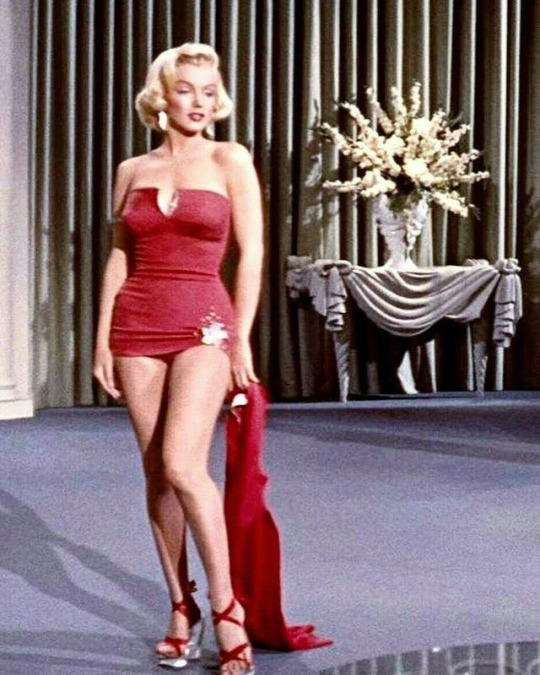

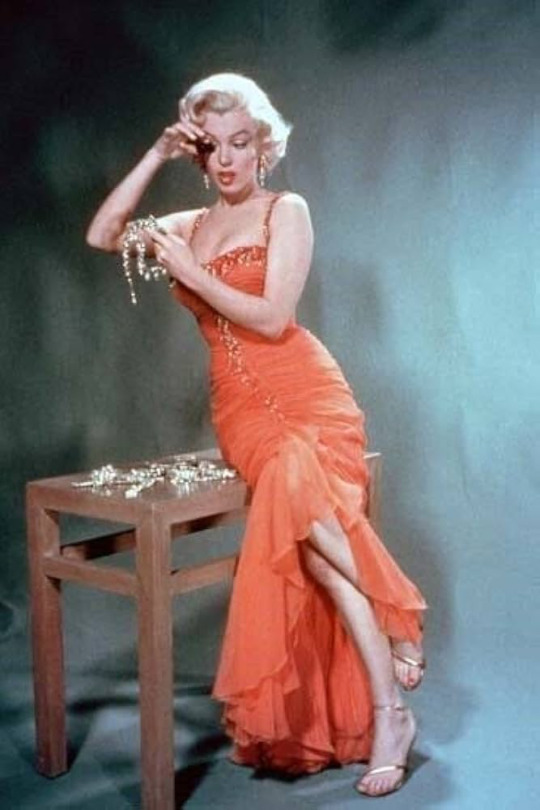
one of my favorite marilyn monroe outfits was her gorgeous deep burgandy silky dress in the film how to marry a millionaire. in this film we get the ICONIC diamonds are a girls best friend and honestly they're right. marilyn sports GORGEOUS diamond jewelry in this movie that rly tie her outfits together and give the air of luxury and opulence that is so so hard to recreate which is why no one can do it quite like marilyn.
marilyn rly made the iconic 1950s glam what it was. everything from her signature platinum blonde bob to her gorgeous, feminine allure. in her film gentlemen prefer blondes shes wearing an absolutely stunning orange dress that shows off her body. it has a super flowy mermaid cut at the bottom which compliments the snugness of the dress around her waist, hips and chest.
i could talk for HOURS about the fashion icon that marilyn monroe is but we dont have that kind of time in this years august issue of the it girls magazine…💬🎀
#honeysitgirlmagazine✨💝#honeytonedhottie⭐️#it girl#becoming that girl#self concept#self care#that girl#self love#it girl energy#dream girl tips#dream girl#dream life#dreamy#hyper femininity#hyper feminine#girly#girl blog#it girl magazine#it girl lifestyle#it girl journey#princess#dolly#fashion#passion 4 fashion#girly magazine#horoscope#monthly catalogue#law of assumption#marilyn monroe#hair care
218 notes
·
View notes
Text
TR! Pili/Mocha Masterpost!
All info is from the OOC Lore stream on 21/1/25 [TALKING ABOUT MY CHARACTER The Realm SMP] streamed on DTownGato
Info will be separated into sections via subject! Feel free to repost this to Twitter with credit! (I have Twitter but no idea how to use it.)
Read under the cut! (Sorry if things are unorganized!)
General Info
Mocha, being a feline hybrid, has tendencies to those similar of a cat, primarily being the instinct to kill and toy with his victims
It was also stated that he is able to purr and meow during this, so it can be assumed most instincts of cats apply to him (Except use of a litter box which was outright stated, he uses a normal bathroom guys)
Mocha is completely asexual, and is somewhere on the aromantic spectrum
He doesn’t have a clear understanding of romance, and wouldn’t do the act of starting a family, cuddling, physical affection
Pili stated that Mocha’s idea of romance differs from the norm but didn’t really clarify what it actually was, I assume well see more of this in character (Personal theory is romance to him is being devoted to one another)
It was stated that he does feel some strong emotions for Pangi that aren’t explicitly romantic but not exactly full platonic as far as I understood?
Also said Mocha could be in a polycule/polyamorous
Doesn’t take flirting or asking people out on dates seriously at all because he doesn’t take romance seriously, even if it hurts people (Asking people out is funny to him though because of their reactions)
An observer and over-analyzer at heart
The thing he hates most is people lying/betraying him
Loves the cold and the snow
Doesn’t have any particular fears, not even death
“Pili is a male calico cat..all calico’s are female, so take that as you will” (TRANS CANON!!!)
Does not take most things seriously, pretty much everything is silly to him
Not the type to have a single home or stay in a place for very long, constantly on the move and changing his home
Pili’s boundaries [I feel this is relevant]: Shipping is ok as long as it is his character, and the other person is ok with it. Gore/Horror art is a yes as well! Just no NSFW!
Dislikes having any sort of attachments, to anything. This applies to people, a place, pets and objects and tries to keep everything at a distance (This seems to have failed with Pangi)
Often lacks empathy for most people
Self-centered and does this for his own gain, and a very transaction person (However, Pili did say that Mocha is not narcissistic)
Mocha is all bark and all bite, he’d fight more if not for the fact he doesn’t wanna be an asshole to other people on the realm OOC as most of them aren’t pvpers
Listens to hardcore rock music!
He had met one immortal previous to being on realms, there is a chance this will come up again as Pili refused to elaborate further
Self-Destructive Tendencies
Highly likely to provoke people into fights for his own pleasure, even and especially if they are stronger than him
Self-loathing, his own biggest enemy and an enjoyer of self-suffering until others get involved (usually this means people he cares about, not so much for people he’s neutral towards)
Mentioned avoidant-attachment style, however I don’t feel comfortable going into more depth as I’m not educated on it. Added on is an uncomfortableness with emotional intimacy as it’s unfamiliar to him
A masochist, does not fear extreme physical pain and often enjoys it (unsure if he believes he deserves it or if he just likes pain in general, could also be both)
Self-destructive with suicidal tendencies and is completely aware of it, does not want to be stopped from doing so
Often drawn to those with high power either to leech off of or fight
Opinions on others
Clownpierce
His obsession started with a challenge from Clown who stated (in a mocking tone) that Pili could try and kill him
From then on he became determined and obsessed with fighting him, uncaring if he won or lost
Due to self-destructive tendencies he doesn’t care and sees loosing or winning as a win, he either gets his ass beat (which he loves) or he wins and gains respect
Enjoys the sort of one-sided obsession, as it’s what he thinks he deserves (Rather than Pangi’s love for him)
Ultimately he does want to be able to prove him wrong but due to ooc reasons (See: The alchemy buff) he’s likely unable to win the fight
His character lost a lot of motivation as well when Clown wasn’t impressed with him fighting and not bringing an actual axe was an extreme regret for him
Roscumber
Genuinely despises her (Quote. Mocha does not like Ros at all)
Purposefully provokes Ros, in the hopes that it will lure in Clown to a fight
Mocha is very aware Ros is Clown’s weakness, just as Pangi is his
He is not above killing her to get Clown’s attention. The only thing that really stops him is that he knows Ros can’t fight very well OOC and it would cause problems behind the scenes
He believes that Ros’ kindness is cute, but extremely naive and that at some point she will bump into someone who is true evil and that her kindness will get her killed
Pangi
Pangi is one of his only weaknesses and his biggest attachment, and he hates him for it in a way
However, Pangi is his ride or die, they have each others backs no matter what kind of atrocities either commit
Although he flirts with everyone for his (and Bad’s) entertainment, he feels that Pangi may have some unspoken feelings for him and due to it feeling somewhat real, he tries to push him away
On the AroAce spec, however he does feel something for Pangi (Not explicitly romantic, this remains unclarified for now?)
One of two people Mocha truly cares about
Pangi’s insistence on trying to stop him from dying rubs him off strange, and the divorce was a test to see how he’d react in a way, which he did fail. However Mocha’s weak spot for him ultimately overpowers anything else
He is well aware he’s a bad person and thinks Pangi’s love is too good for him, resulting in Mocha trying to push him away as it feels undeserving and Pangi needs better
Badboyhalo
Mocha somewhat sees BBH as an older brother, however he does not understand family dynamics as he has never had a family
One of two people he actually cares for
Is more likely to inform Bad of secrets than he is Pangi, because he knows Bad would not have any extreme emotional reactions to loosing him and will not form an attachment to him
Would likely fight him for fun and choose to fight him over Foolish out of curiosity to see what would happen if he died
Finds his relationship with Foolish entertaining and analyzes it closely
As far as we know, the only person who has ever made Mocha have a panic reaction (Occured when Bad killed him) due to catching him completely off guard
The main reason Mocha asks people out is for Bad’s entertainment (And his own, but he enjoys making Bad laugh)
Foolish
Mocha is drawn to his immortality and strength and is extremely curious about him
His bickering with Bad is a source of entertainment to him
Krowfang
Mocha is somewhat protective of her (This comes both from the in character deal of protection between them, as well as being close friends irl)
Thinks it’s ballsy for stealing the bell and antagonizing Owen, but approves and would consider him an ally
Jonnaay
Thinks he is worth training and protecting after seeing the somewhat attempt on Tubbo’s life with the anvil trap
Believes he could have potential
Badlinu
Thinks he’s chill, maybe a bit endearing however he falls into pretty much the same category as Sausage
As in, he likely won’t help with quests and is mainly there to build
Smajor1995
To him, Scott is not even really a red faction member, instead blue
Scott had contributed nothing towards the quest and mainly builds
Others+
AverageHarry dies too much but he at least tries
Tommy/Slimcicle/Baghera don’t log on enough for him to have an opinion on them
#trsmp#realms smp#dtowncat#pili dtowncat#tr!pili#pangi#clownpierce#Roscumber#badboyhalo#foolishg#the realms smp
92 notes
·
View notes